THE DEPUTY PGM


THE DEPUTY PGM


HERTFORDSHIRE 2030 FESTIVAL APPEAL
A fundraising appeal held to raise vital funds in support of the Masonic Charitable Foundation. THE LONG TABLE
We visited Stortford Lodge 409 to experience first-hand what makes it different.

















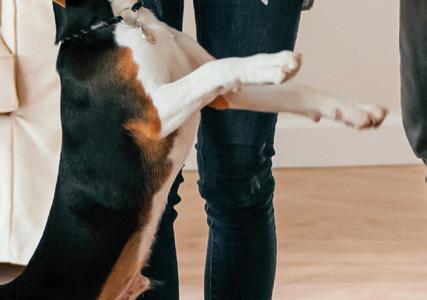










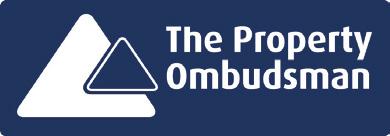










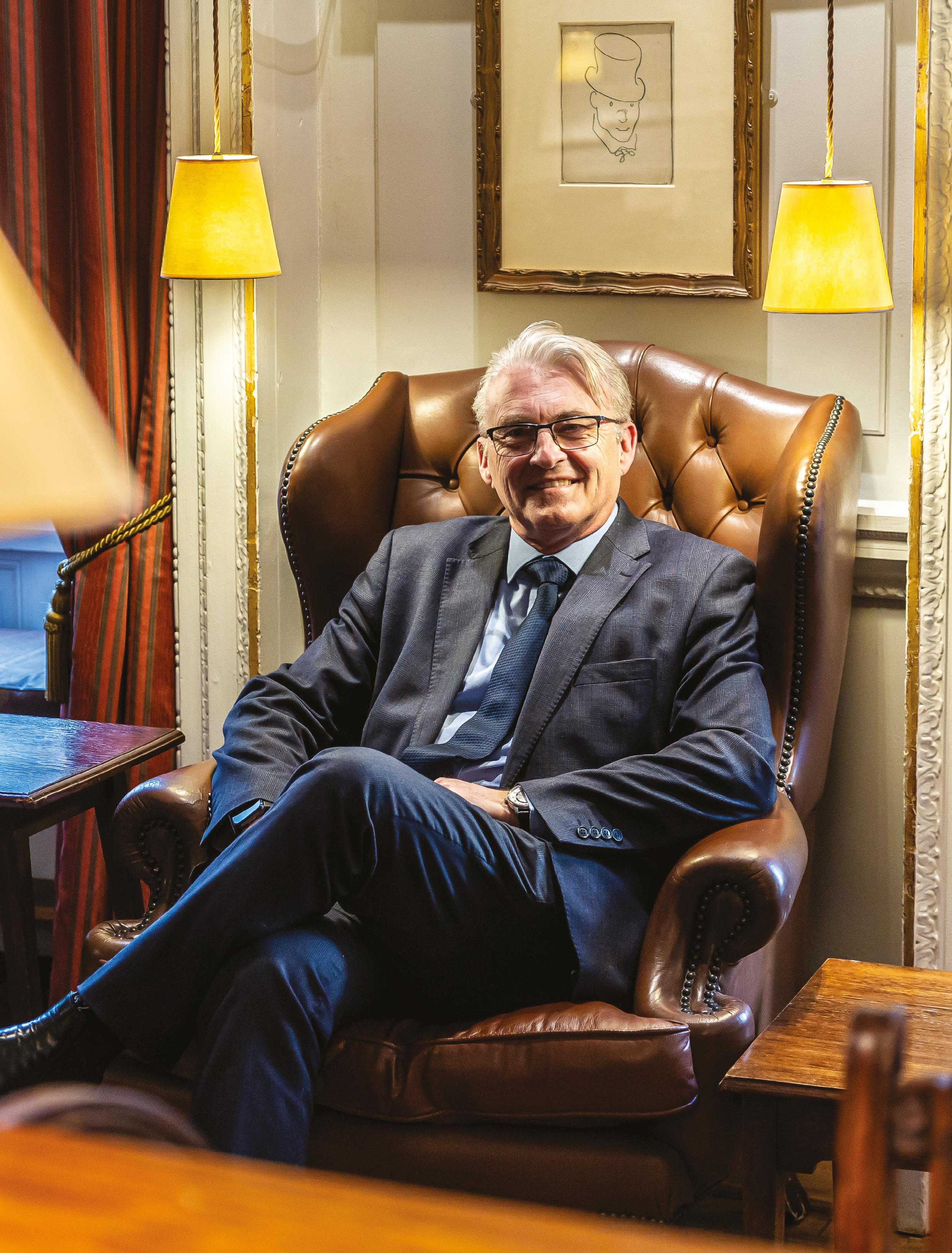
There is no doubt that Freemasonry across the country is facing one of the most significant membership challenges in its history, and Hertfordshire is not immune to this.
We continue to be successful in attracting new candidates, with around 100 initiations each year. Encouragingly, most of these come through existing members, with around 20 to 25 joining without a proposer. However, despite this promising intake, we still experience a net loss in membership. Each year, approximately 300 members leave us, whether through resignation, lodge closures or, sadly, death. We are still losing more than we gain.
So how do we respond? We do it by balancing tradition with progress, a challenging but necessary task.
The word “tradition” is often repeated but frequently misunderstood. Masonic tradition, in its truest form, is built on the practice of every moral and social virtue. It should not be mistaken for a rigid habit. You will have heard me say, many times, that tradition should be the celebration of fire, not the worship of ashes.
Lodges that are willing to move forward, while maintaining the dignity and integrity of our ritual, are the ones beginning to thrive. The return of multiple ceremonies, once a common feature of lodge life, has become a sensible and effective response to modern membership needs. Lodges embracing this approach are seeing increased engagement, stronger attendance, and a welcome vibrancy at meetings and festive boards.
Involving newer members in the ritual, by sharing tracing boards or charges between several brethren, keeps them engaged and connected. Dividing the work into four, five or six parts not only maintains interest but also helps newer members find a natural path of progression within the lodge.
During the boom years of the 1980s and 90s, many lodges had more than 70 members. Meetings often started earlier and were briefly called off to accommodate ceremonies. Today, with an average membership closer to 23, this is no longer necessary. However, it
may be worth reconsidering the format of meetings or adjusting start times. Most Provinces now begin their meetings at 6pm and are seeing growth as a result. That alone is worth noting.
Perhaps our greatest challenge as an organisation is to remain relevant to the communities from which we are drawn. This has not been easy, particularly given that Freemasonry has been perceived as secretive since the 1930s. That perception is now changing. We are becoming more open, more visible, and more engaged with our communities, and we must continue down this path.
Several lodges are leading the way by holding white table events around Grand Lodge or longservice certificate presentations. These evenings invite non-Masons into the lodge to learn a little about who we are and what we do. A simple explanation of our history, symbolism and values can go a long way. While some of these events have resulted in new candidates, their greater value lies in the understanding they build among friends, family and the wider community.
At the same time, we must ensure our own members feel that Freemasonry is worthy of their time. In today’s fast-paced world, time is one of our most precious commodities, and people will only commit to something that offers genuine value and meaning. Good quality ritual is fundamental to this coupled with adapting our meeting structure, considering earlier start times, and remaining flexible in how we conduct our business will all help us remain relevant. Those lodges that are doing so are already seeing the benefits.
Retention is rooted in engagement. We need to encourage attendance not only from those who are active, but also from those who may be struggling to attend. Whether due to work commitments, advancing age, night-time travel concerns or care responsibilities, some of our members need more support than others. Lodges that make
the effort to accommodate and include them, whether through transport, scheduling or outreach, are seeing stronger attendance and greater cohesion.
Just as important is the social side of Freemasonry. Lodges with strong, inclusive social programmes, involving wives, partners, children and grandchildren, build bonds that go beyond the lodge room. These relationships enrich the Masonic experience and foster loyalty. If your lodge is celebrating a milestone or planning an event, I would encourage you to consider a white table evening. The Provincial Executive would be delighted to attend and support you in hosting it.
We need to be more visible and more active in our communities, raising our profile and showing the relevance of Freemasonry in the modern world. We could learn a great deal from organisations like Lions International, who are growing because they are deeply involved in public-facing projects.
Ultimately, experienced Freemasons have a vital role to play. It is your knowledge and example that will guide our newer members. Nurture their enthusiasm and help them grow in confidence. We want our lodge rooms to be places where members experience high-quality ceremonies with genuine love and friendship.
Despite the erasure of over 25 lodges in the past four years I remain confident that Freemasonry in Hertfordshire has prevailed for 230 years. We must continue to remember that we are the custodians of what will become tomorrow’s masonic experience.
As I visit around the Province, I am filled with optimism that the celebration of the fire that is Happy Hertfordshire will lead us into a different but bright future.
Yours sincerely and fraternally, Neil Connolly
Provincial Grand Master of Hertfordshire
When Ollie Wells joined Freemasonry, he never imagined he’d one day become Deputy Provincial Grand Master of Hertfordshire. “It’s a real honour,” he says, still sounding surprised. “I was originally just happy to be considered for a provincial office, never mind an active one, And then… it just got better and better.”
Ollie’s journey as a Provincial officer began in 1997, as part of the Provincial Prior’s bodyguard in the Knights Templar Order. It was, in his words, “the starting gun for everything else.” But beneath the formal regalia and ritual, what shines through most is his grounded, people-first approach.
The new role brings new responsibilities, some of them not for the faint-hearted. “The Deputy is often involved in disciplinaries,” he says, matter-of-factly. “You possibly need to be a little harder than you are as an Assistant Provincial Grand Master. But it’s nothing I haven’t dealt with before.” That’s no understatement, Ollie spent many years holding senior security management roles in the pharmaceutical and banking
industries, protecting staff and investigating internal matters. He’s seen pressure, he’s dealt with conflict. He’s also developed the kind of calm clarity that this new role demands.
Still, he doesn’t see Freemasonry as a job. “It’s a hobby. We do it because we enjoy it. That’s the important thing, to make sure people enjoy their Freemasonry. If they do, they’ll come back, and they’ll bring like-minded people with them.”
Ollie’s particularly passionate about making sure newer members have a good experience. He’s continuing his work on the Visiting Officer scheme, “It’s a long-term investment. We’re changing the way we do things, and I’m looking forward to seeing what improvements that brings.”
When talk turns to change more broadly, Ollie doesn’t hesitate. “Change is good, not for its own sake, but because nothing is beyond improvement.” He speaks about the shift happening across Hertfordshire: new faces in leadership, new ways of doing
things, and a recognition that to grow, Freemasonry needs to tap into the skills of its members. “We’ve got 4,000 members. Some are professionals, some are retired, but they’ve all got valuable experience. We’re just not using it, because we don’t know it’s there, so that is something we need to work on.”
In the past, some roles have possibly ended up going to the most well-known person, rather than the best fit for the job. Ollie wants to change that. “We’ve had well-meaning people doing jobs that weren’t necessarily right for them”, he says. “But with all the demands and expectations we face today, we really need people who know what they are doing.”
“It’s a hobby. We do it because we enjoy it. That’s the important thing — to make sure people enjoy their Freemasonry.”
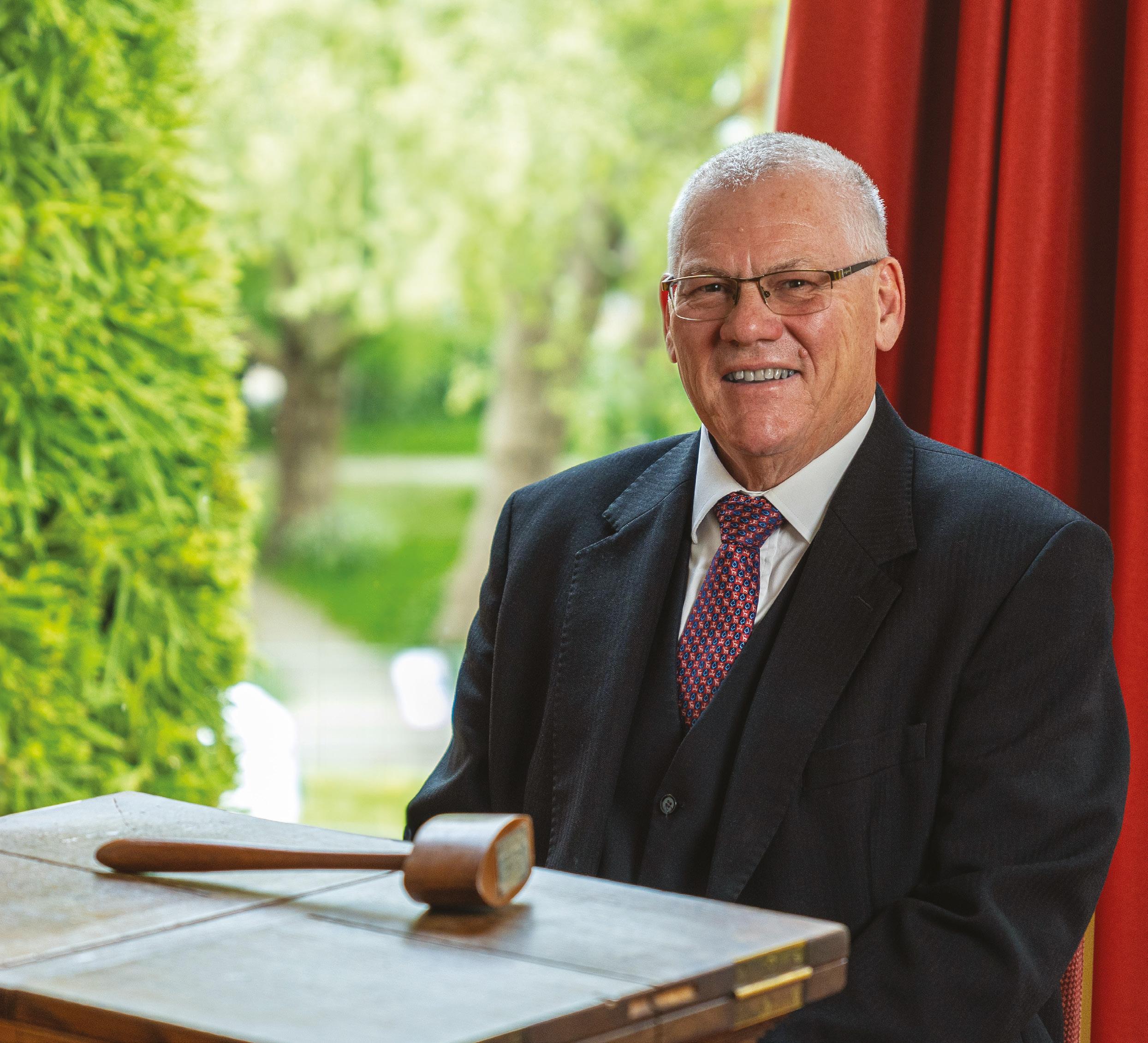
“It’s all about spotting talent early and helping people grow.” That includes having open conversations about where members see themselves in the future. “Let’s talk about the journey,” he says. “If someone wants to become a Treasurer, Secretary, Steward – or even a Provincial Grand Master one day – then let’s help them strive to achieve those personal goals.”
His approach to the Royal Arch is similarly pragmatic. Encouraging newer Masons to join, he says, “It’s different, in a good way. When I first walked in, I expected more of the same, and I was totally
surprised. The language, the structure, it’s a challenge, but a rewarding one.” For those worried about the commitment, his advice is simple “join, sit quietly, absorb it. Get involved a little at a time. If you enjoy ritual, you’ll love it.”
And why did Ollie become a Freemason in the first place? That takes him back. “I’ve wanted to join since I was about 13. My uncle and my dad were Freemasons. They’d get dressed up, go off to meetings, and come back clearly having had a great time. I was fascinated.”
The love of history has always been there. As a boy, Ollie spent his summers swinging a pickaxe on Roman archaeological excavations. “There’s something about discovery,” he says. “And Freemasonry’s like that too. You learn something new, it clicks, and it feels like you’ve found a little piece of treasure.”
In Ollie Wells, Hertfordshire Freemasonry has found its own treasure, a Deputy who brings integrity, insight, and a touch of that archaeological wonder. He may be stepping into big shoes, but he’s bringing his own boots.
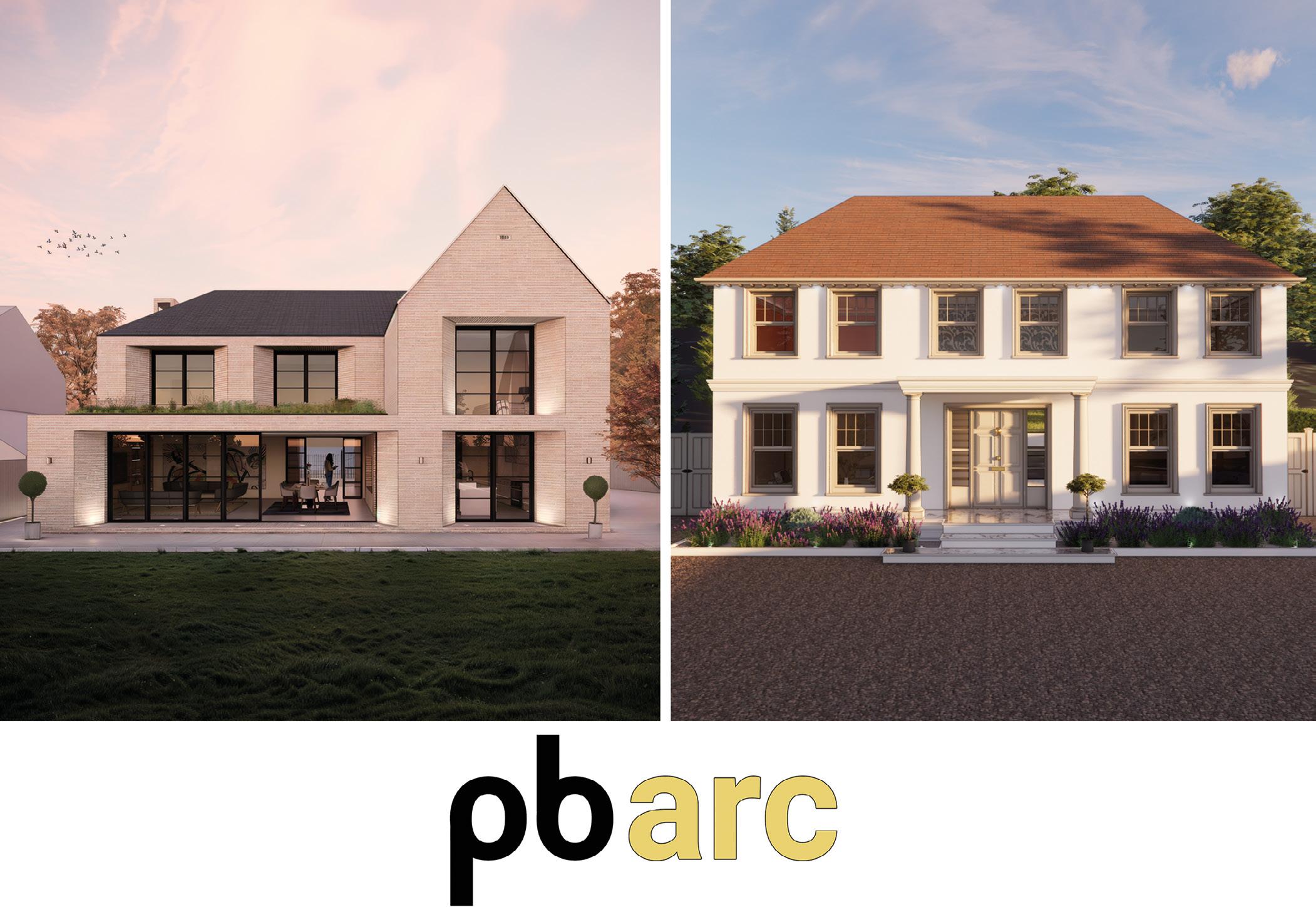

Here at Fleet House we are pleased to offer a complete regalia service. We provide a reliable, cost effective and speedy service with both new and high quality used items.
For special requirements and further information please contact: Provincial Grand Lodge of Hertfordshire Fleet House, 10 Parkway, Porters Wood St Albans, Herts, AL3 6PA.
Email: provgen8@pglherts.org Telephone: 01727 833 061
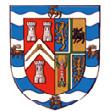

The Provincial Office is Open: Monday to Friday 09:00 to 15:00
Freemasonry is built on tradition, camaraderie and dedication, and nowhere is this more vividly displayed than within the Royal Arch. With the recent appointment of David Hampton as the new Most Excellent Grand Superintendent of Hertfordshire’s Royal Arch Province, a thrilling new era of growth, ritual excellence and community spirit is upon us.
David’s Masonic journey began 34 years ago, initiated in December 1990. What drew him to Freemasonry were shared values, qualities honed from his days in the Round Table and Rotary. His career in the hospitality sector instilled a natural ease in connecting with others, creating bonds of fellowship wherever he travelled.
Introduced to Freemasonry by a friend, David quickly became immersed in its vibrant community. His path was marked by consistent progression, including five times through the chair in both Craft and Chapter.
Reflecting on his various roles, David jokes: “I love putting myself under pressure, it’s always tight, but somehow I get there in the end!” He has distinguished himself in every ceremonial role he has undertaken, from Deputy Sword Bearer in 2007 to Deputy Director of Ceremonies, and ultimately as Deputy Grand Superintendent under Jim Sharpley, whose partnership was instrumental in refining and energising the province.
David’s tenure promises excitement, renewed vigour and a commitment to enhance ritual experiences. He firmly believes that the strength of Royal Arch ceremonies can profoundly impact its members.
To this end, he is spearheading a dedicated provincial team that will support chapters in elevating their rituals, ensuring each new member is inspired by an impactful and memorable experience. This approach has already seen
impressive success, one inspired companion recently introduced seven new members, illustrating the powerful effect quality ceremonies can have.
The cornerstone of David’s vision is growth. Recognising the essential link between the Craft and the Royal Arch, he is pioneering initiatives that enhance collaboration and communication between the two.
As David humorously reflects: “Why would you read three-quarters of a book and not finish it?” This playful analogy underlines his belief in the Royal Arch as a crucial and exciting culmination of a Freemason’s journey.
David’s commitment to a unified Freemasonry is exemplified by closer relationships with Neil Connolly and the Craft executive, underscoring the belief that shared resources and mutual support are vital to the prosperity of both orders, “We are one organisation”.
Under David’s guidance, chapters are encouraged to embrace education, understanding Freemasonry as a profound fourstep journey. As David emphasises: “It’s essential to communicate clearly from the start that Freemasonry culminates in the Royal Arch; it’s about completing the journey.”
With proactive Royal Arch Representatives positioned strategically within lodges, David aims to substantially increase Hertfordshire’s Royal Arch membership from it’s very positive 40%, bringing new vibrancy and strength to the order.
Reflecting on his appointment day in the Grand Temple at Freemasons’ Hall, David shared the overwhelming joy of the occasion, appreciating the unity and positivity evident among his companions.
His message was clear and upbeat: “We’re in this together, let’s enjoy it and have some fun.” His enthusiasm, backed by meticulous planning and passionate advocacy for ritual excellence, signals bright days ahead for Hertfordshire’s Royal Arch.
As David warmly summarises his philosophy: “Freemasonry is our hobby, so let’s make sure we enjoy every minute.”
In celebrating David Hampton’s ascension as the Most Excellent Grand Superintendent, Hertfordshire Freemasonry stands on the threshold of a thrilling new chapter, one defined by vibrant ceremonies, strengthened membership, and an unyielding dedication to fellowship.
To discover more about the Royal Arch, visit the official website: www.herts-chapter.org.uk
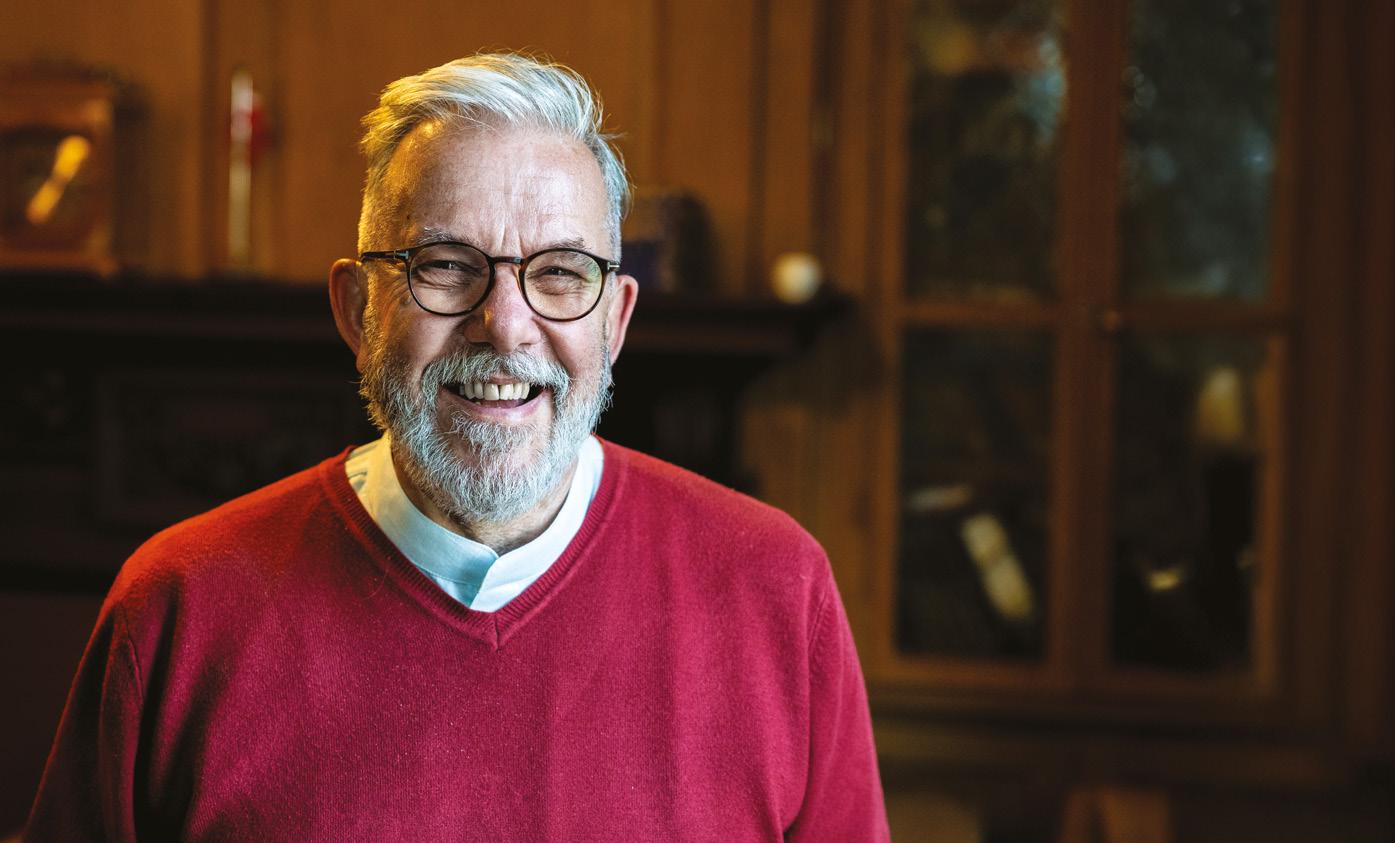
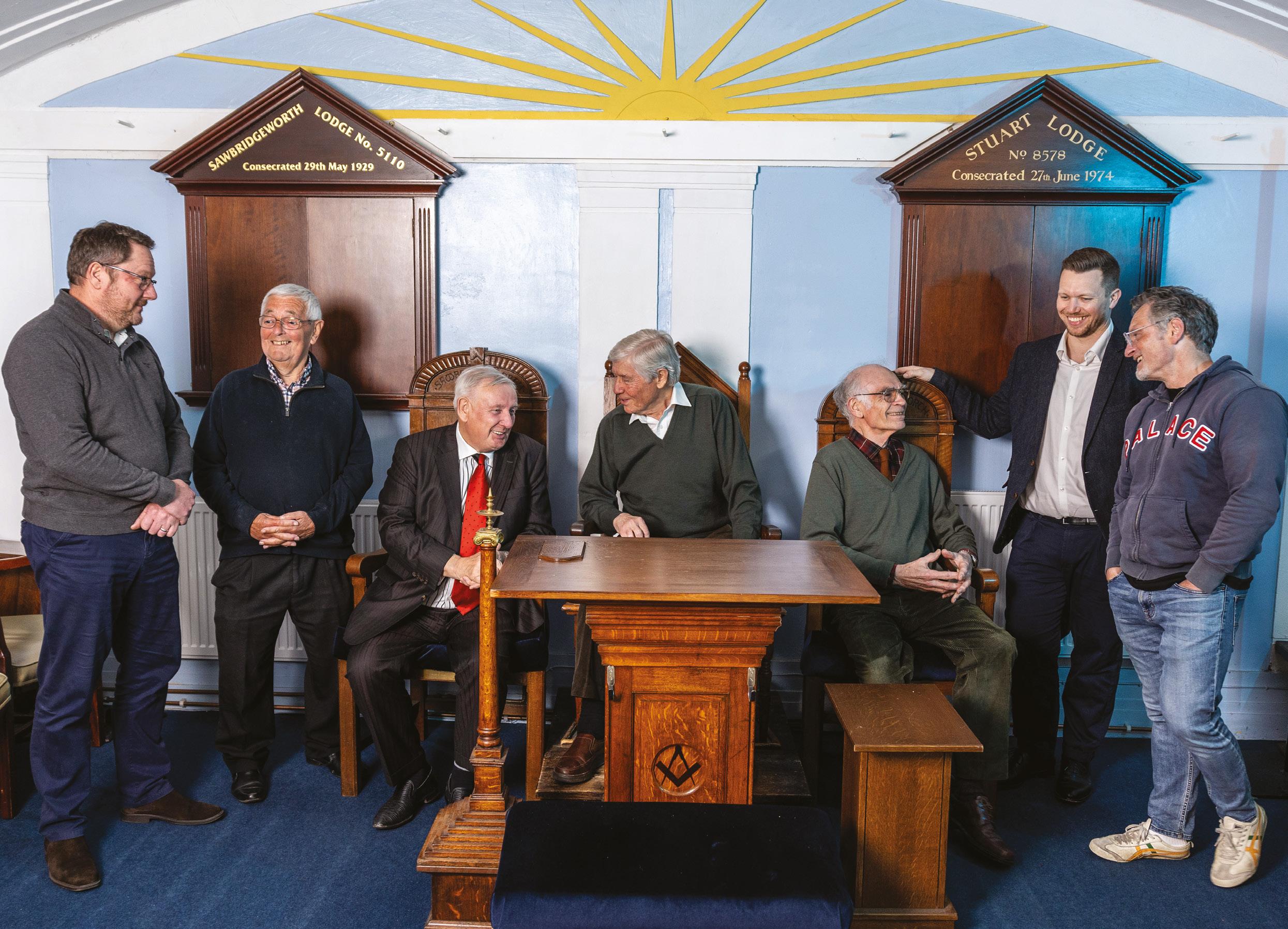
The traditions and workings of a lodge are a central part of its character and charm. Dan O’Connell visited Stortford Lodge 409 to experience first-hand some of what makes it a little bit different
Step into Stortford Lodge on a meeting night, and you’re stepping into something that feels both timeless and entirely alive. It’s Freemasonry, but a little different, with a warmth and rhythm that sets it apart.
I had the pleasure of interviewing a group of it’s members, sitting in the very room where generations have gathered, and I came away with the sense that I’d discovered one of Hertfordshire’s best-kept secrets.
Founded in 1831 and steeped in almost 200 years of history, Stortford Lodge 409 has never been one to follow trends for the sake of it. Instead, it has created it’s own brand of masonry, based on steadfast
tradition, careful recruitment, a fierce dedication to doing things properly, and its own furniture.
So what makes Stortford Lodge so enduring, so admired, and, dare I say, quietly revolutionary in a Masonic world that’s increasingly focused on modernisation? It starts with expectations.
“It’s Freemasonry, but a little different, with a warmth and rhythm that sets it apart.”
“We don’t have to work at retention. It just happens. Because the experience is so rich, so meaningful, and so well looked after.”
“When someone joins this lodge, they’re told straight away what it means to be part of 409,” one senior member told me. “Other lodges might share furniture or work around the space they have. We bring in our own tables, thick enough to accommodate some proper firing glasses. We set up our own festive board each time. It’s a commitment, but it’s what makes the experience.”
The word “experience” came up again and again. Whether it’s dining around our long table, rather than the traditional head table with multiple sides, or maintaining long-standing customs like the bone marrow starter, the unique nine o’clock toast, or their signature cloth-rolling, everything here is done with purpose, care, and passion. While some traditions are proudly shared, others are kept deliberately under wraps, subtle, time-honoured moments that can only truly be appreciated by visiting in person.
This passing down of culture is no accident. The older members play an active role in setting the tone, gently guiding newer brethren into the customs, roles, and rhythms of lodge life. “You’re never left wondering what you should be doing,” said one of the more recent members. “You absorb it by watching, listening, and being part of something that clearly matters to everyone around you.”
And that, perhaps, is the secret. This lodge doesn’t tell you it’s special. It shows you.
The result? An almost unheard of retention rate. Members who join never leave. In fact, out of 26 subscribing members, they are all active and those who live far away still make the effort to attend. In a province where many lodges hover at 60% attendance, Stortford consistently achieves over 90%.
“We don’t have to work at retention,” said one member. “It just happens. Because the experience is so rich, so meaningful, and so well looked after. You feel part of something bigger from day one.”
Recruitment here isn’t rushed either. Prospective members are usually already close friends of someone in the lodge, and only after careful conversations and a warm, informal introduction to the lodge’s culture, does the journey begin. “We don’t chase numbers,” one Past Master said. “We look for the right people. Quality over quantity is important to us.”
That philosophy extends to the structure of the year. The lodge meets just four times annually enough to keep momentum, but not so much that it becomes a chore. “Those dates go in the diary like Christmas,” said another member. “We begin with Installation, and the master will perform all three degrees in his year.”
And yet, for all its heritage, the lodge isn’t immune to change. A recent double initiation, the first in a while, was embraced to prevent a new candidate from waiting a full year. “We adapt where it makes sense,” one member explained. “But only in ways that support the lodge’s spirit, not compromise it.”
Their approach to tradition is practical, not dogmatic. Take the single long table at the festive board. It limits numbers, but it encourages conversation, unity, and a genuine family feel. The beehive-emblazoned Master’s chair and 300-year-old Bible, are lovingly maintained and steeped in symbolism, carefully preserved for members of the future.
Outside of meetings, members stay connected through WhatsApp, officers’ nights, cricket days, golf events, and what can only be described as an almost invisible support network. “If someone’s wife is unwell, if someone’s struggling you’ll know. The lodge rallies without being asked.”
It’s this culture of care, of commitment, of quiet excellence that is truly inspirational. While many lodges are looking outward for innovation, Stortford 409 is looking inward, deeper into what already works, refining it, reinforcing it, and handing it down.
As one member put it: “You don’t join 409 and try to fit in. You join, and you’re shown how to belong.” And in a world, and a Craft, that’s constantly changing, perhaps there’s nothing more modern than that.”
“You don’t join 409 and try to fit in. You join, and you’re shown how to belong.”





HOME CINEMA
* INSTALLATION * CALIIBRATION
Acoustic Treatments * Fabric Walls
Fibre Optics (Starlight Ceilings)
Sound Proofing Control for Automation
Garden Audio * Party Rooms
Nightclub, Bar & Restaurant Audio



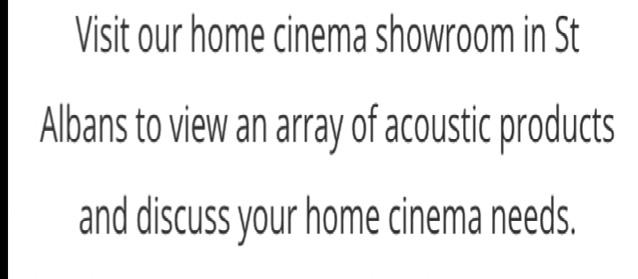
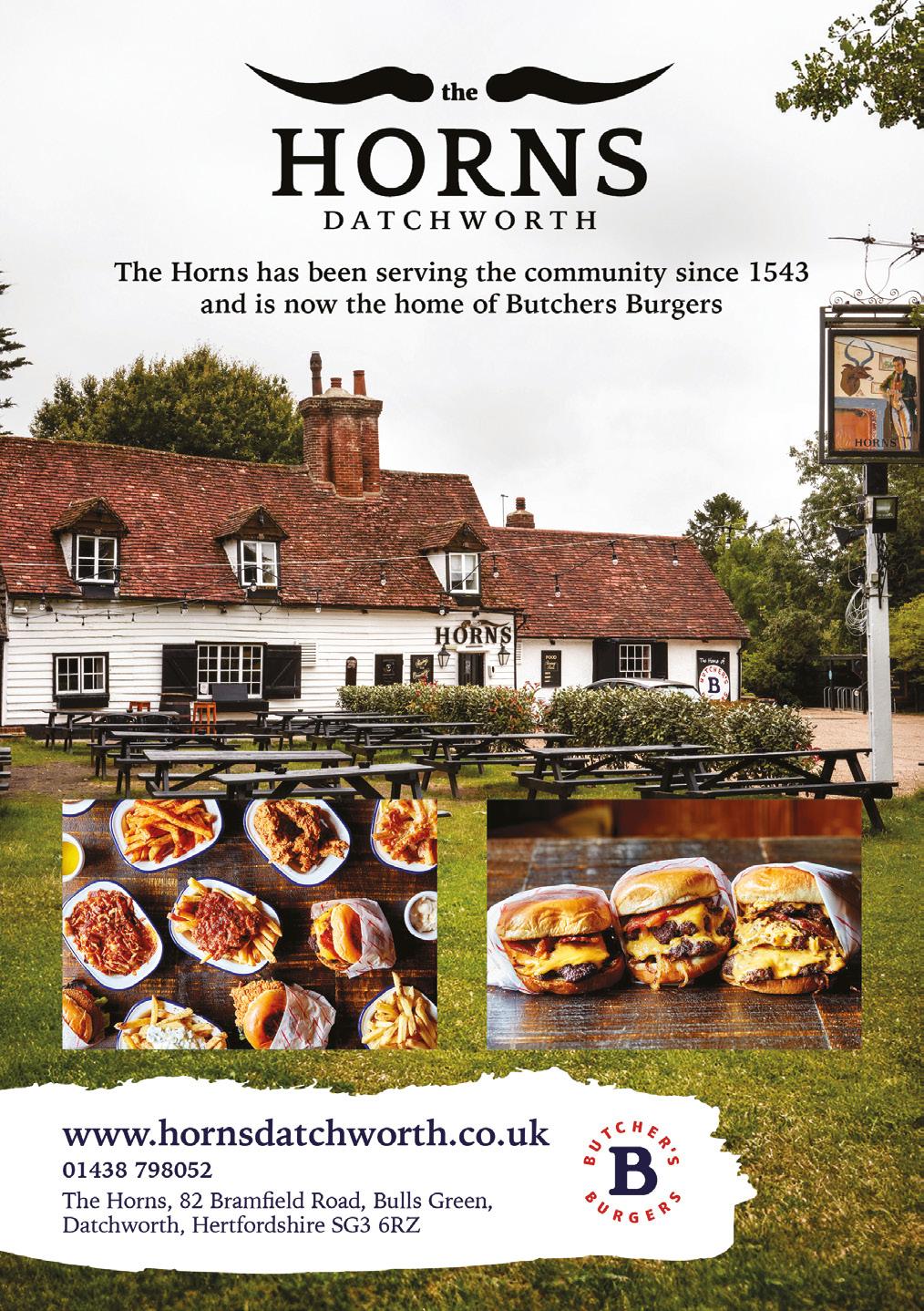
While the Mark Degree is already well-loved for its ritual, camaraderie, and deeper understanding of Freemasonry, Jim Harrison, Head of the Mark and Royal Ark Mariner, is keen to shine a light on the Royal Ark Mariner. “It’s something completely different, although administered by the Grand Lodge of Mark Master Masons, the ritual is unique, based on the story of Noah and the Ark. It adds another layer to the Masonic journey.”
The Mariner Degree, which traces its symbolic lineage to ancient flood myths, is deeply meaningful. “You don’t have to be Christian to join,” Jim emphasises. “Noah appears in the scriptures of many faiths, so it remains inclusive and relevant.” He adds that while its layout and ritual may differ from other degrees, it echoes much older traditions, including the early positioning of wardens in historic Masonic lodges.
One practical advantage of joining the Mariner is its structure. “Each Mariner Lodge is ‘moored’ to a Mark Lodge, and usually meets on the same day,” Jim explains. “So in essence, you’re getting two meetings in one day, making it time and cost efficient.”
Beyond ritual and symbolism, the Mark Master Masons and Royal Ark Mariners of Hertfordshire are making a meaningful impact in the
wider community. Over the past 12–18 months, the Province has been supporting a major project at Bridgewater Primary School in Berkhamsted. The school, needing a space for vulnerable children and those with special educational needs, lacked suitable facilities. “They were having to use broom cupboards for one-on-one sessions,” Jim recalls.
The school’s ambitious plan was to demolish an old caretaker’s bungalow and replace it with a purpose-built space, aptly named The Haven. Although they’d raised most of the funds, they were still around £49,000 short. “Thanks to the fantastic efforts of our members and generous support from the Mark Benevolent Fund, that gap was filled. The Haven is now under construction and due to open later this year.”
Support for the national Grand Master’s Keystone Fund has also been strong. This fund, commemorating Prince Michael of Kent’s 40th anniversary as Grand Master of the Mark degree, focuses on the educational, sporting and vocational needs of young people, especially the families of Freemasons. The Mark Province of Hertfordshire is proud to acknowledge that there are a number of Mark and Mariner Members and Lodges who have given their support to this Fund and have qualified to wear a
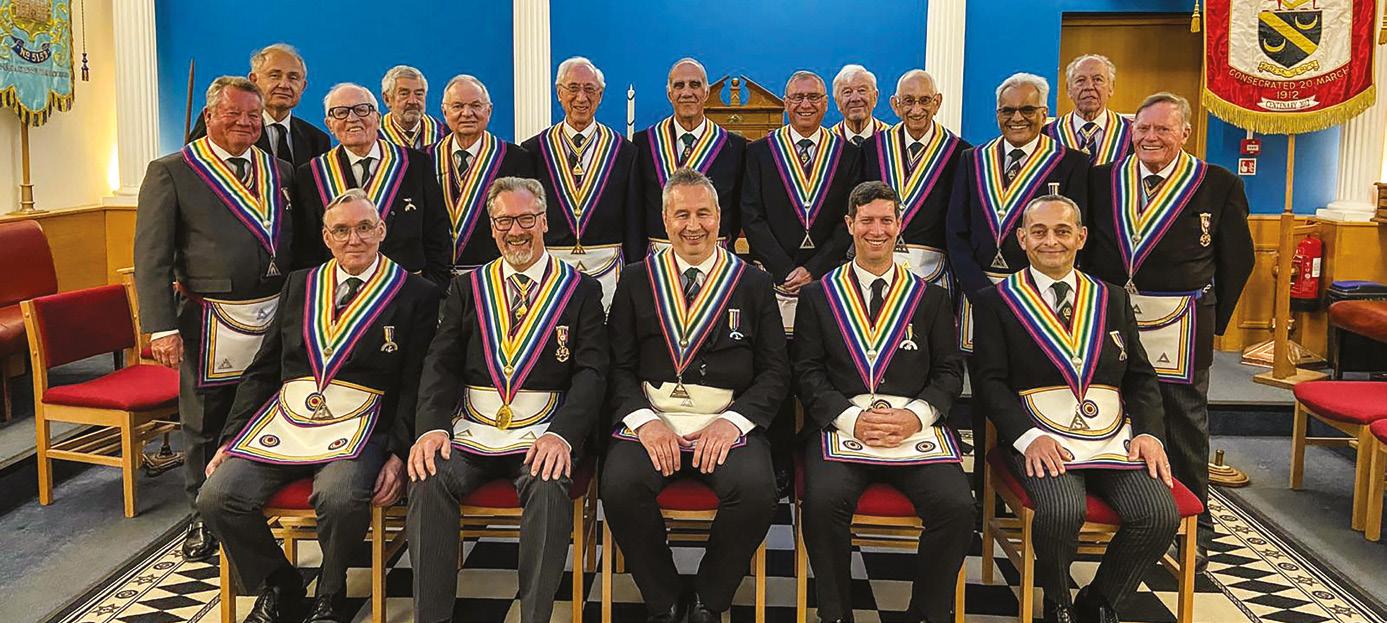
special commemorative jewel in recognition of their generous giving. Indeed, the Province itself has qualified in both the Mark and the Mariner degrees.
On the membership front, Jim is focused on providing the right information. “We’re not about twisting arms or putting heavy hands on shoulders,” he says. “Everyone’s journey is personal. What’s right for one Mason might not be right for another at a particular time.” For those who do join, the experience can be transformational. He highlights the recent advancement of eight candidates in a single ceremony at Gladsmuir Lodge as a high point of the year. “Nobody who was there is going to forget that in a long, long time.”
To raise awareness and interest, the Province has embraced initiatives like information dispensers at Masonic Centres and joint events with Craft Masons. “Blue and white table events, where we invite Craft Masons to come in, see the regalia and layout, and to learn more about the degrees, have been really well received. It’s try-before-you-buy Freemasonry,” he smiles.
Looking to the future, Jim’s vision includes deeper integration between Masonic and family life. “We’re working on a new Sports and Social Lodge to help bring friends and families into what we do,” he says. Planned events could range from pub games to barbecues to stadium tours. “It’s about being not just charitable, but present and active in our communities.”
His final advice? “Talk to someone you trust. Find out what’s right for you. If you love ritual, if you want to deepen your Masonic experience, the Mark, and the Mariner have a huge amount to offer.”
Provincial Grand Secretary Tom Johnston unpacks what happens at the offices at Fleet House in St Albans, and looks ahead to what’s taking place in the new masonic year
At our Provincial Office, the volunteer team, and what it undertakes every day, has started with a familiar feel.
We have recently issued almost 300 invitations for Provincial first appointments and promotions within Provincial Grand Lodge, and continue to track those who are delighted to have received honours.
I have also commenced the planning for the Hertfordshire Provincial Dinner following the Annual Investiture Meeting on the 30th April for those receiving honours in Grand Lodge.
The Executive members are representing Hertfordshire at other Provincial Grand Lodge meetings in locations
surrounding the Province, together with UGLE Quarterly Communications, briefing and training at Freemasons’ Hall in London.
The office team also actively assists members’ of the Province with general queries relating to procedures within the Book of Constitutions, Hermes and the setting up of individual members’ details on the new Portal system.
We continue to provide guidance on summonses, bylaws and have started to prepare information on 158 Lodges and other Orders for the new provincial yearbook.
As summer approaches, we turn our attention six months in advance to planning the Provincial Grand Lodge of Hertfordshire’s Annual Meeting, to be held on the 24th September at Freemasons’ Hall, London. If you have never experienced this event and are a Master Mason, please do so, as you will be supporting your fellow members of the Province celebrate their honours, witness the splendour of the Grand Temple and dine with friends in the Grand Connaught Rooms,
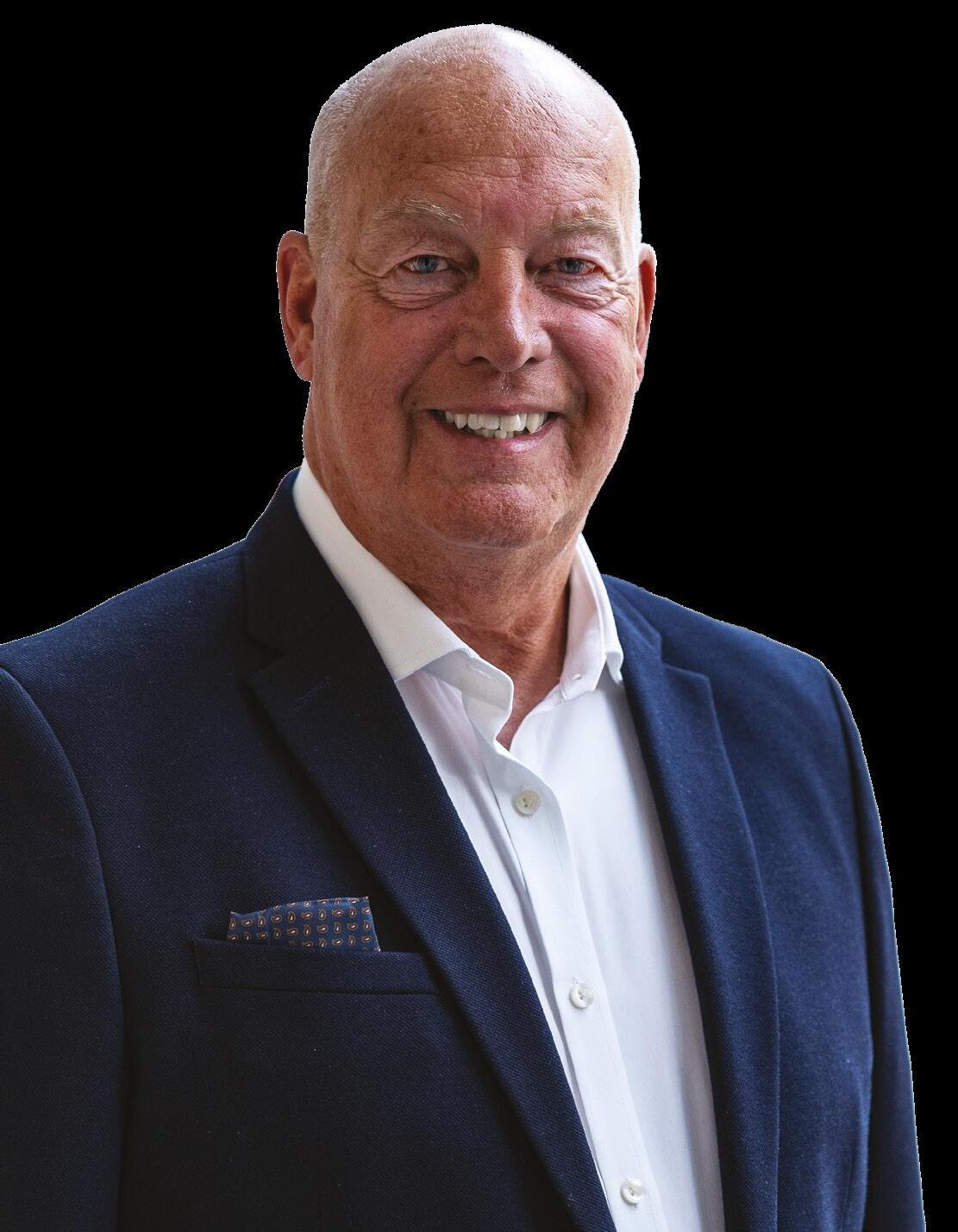
I promise you will not be disappointed.
Despite its familiar feel, this year will see changes through the creation of a Provincial Strategy. The Province is currently experiencing more losses in membership than it is gaining.
UGLE call this the “Membership Challenge”. Since the end of last year, senior members of the Provincial Executive and I started to evaluate the causes behind our losses. We asked ourselves searching questions about our operating practices and how we could improve what we do and how we do it.
We examined the responsibilities of the main Provincial Officers and how they were guided, supported and to what extent we expected them to perform their duties. We agreed to focus on finding not only those big ‘step change’ ideas but also those ‘marginal gains’ that collectively improve our performance and enjoyment of Freemasonry.
At the beginning of February, we presented our initial findings to the whole Executive, including those that will be joining the Executive in September. The response to what was presented was extremely positive and unanimously endorsed by those present.
We agreed a period of reflection to consider what further actions we could include in our plans and ensure those we had shared were robust. We will meet again to finalise our plans and approach in sharing information with all members of the Province.
I can assure everyone that this year will be an exciting time to be a member of Hertfordshire, and all will be invited and encouraged to adopt a ‘Yes, if’ attitude, to ensure we will deliver our plans with confidence and meet our “Membership Challenge”.
By Dan O’Connell, Provincial Communications Officer, Hertfordshire Freemasons

There’s a certain rhythm to good communication. It doesn’t shout. It doesn’t show off. It simply turns up at the right time, with the right message, in the right tone and lets people feel connected, informed, and included. That’s been the focus across our communications work in Hertfordshire this year. No grand claims, Just steady progress, and a lot of teamwork.
The digital newsletter lands in inboxes on the first of each month, offering a clear line of sight into what’s happening across the Province and within our lodges. It’s becoming a helpful habit, and from the feedback we’ve had, it’s quietly doing its job.
We’re still working closely with local media too. When stories emerge that shine a light on Freemasonry’s community spirit, supporting charities, volunteering, or simply being good neighbours, we make sure they’re shared. It’s one of the simplest ways to show what Freemasonry really looks like in action.
One of the liveliest developments this year has been the formation of
a new social media team. Armed with fresh ideas, good humour, and an eye for what makes people stop scrolling, they’ve been building momentum across our channels. Whether it’s celebrating our history, spotlighting lodge events, or highlighting our Provincial leadership team, it’s all helping us grow our online presence in a human and engaging way.
Then there’s the new Provincial website. Built to be appealing to the public, but give our members the tools they need. Membership enquiries have more than doubled since launch, and Freemasons now have a central place to find key documents and information. Again the feedback has been really positive, and we continue to adapt and adjust accordingly.
Looking ahead, we’ve got some exciting work in motion. A new membership campaign is being piloted in Cheshunt, designed to open up conversations with people who are interested in joining Freemasonry. The campaign has been developed with Dan Thurlow and Brian Handley, and we’re hopeful it’ll grow into something
that can support lodges across the Province in welcoming the next generation.
We’re also starting a new Provincial WhatsApp broadcast group. It’s one-way only, so no endless chat threads, just clear, occasional updates on news, events, and opportunities. Think of it as a gentle tap on the shoulder when something matters.
None of this happens in a vacuum. Everything here reflects the work of a team who care deeply about getting things right, not just in what we say, but how we say it. So, a sincere thank you to Andy Jackson, Ben Marques, Kev Marchant, Lee Cocklin, Mike Sylvester, Steven Gordon-Wilson, James Davis, Andrew Murray and Tom Golds. Their thoughtfulness, energy, and attention to detail underpin everything we do.
There’s always more to improve, more to learn, and more stories to tell. But with a solid foundation and a shared sense of purpose, we’re in a good place and ready for whatever comes next.
Al White, Head of Herts Knights Templar, explains what the Christian order has been up to in the past 12 months
It’s hard to believe COVID was five years ago. Like many other Orders, KT is still feeling the aftereffects. People discovered new interests during lockdown, and our challenge is to re-engage them. We can’t take membership for granted and must create compelling reasons for members to attend and invite others.
Interest in KT remains high, both inside and outside Freemasonry, and our ceremonies are dynamic and interactive. At a recent double installation, the candidates were blown away and didn’t want the evening to end, which is a testament to the strength of the experience.
Each Preceptory gets two official visits a year: one from me and one from the Sub-Prior. When I visit, I’m accompanied by a full Bodyguard and Escort. These visits have a significant impact, often doubling attendance.
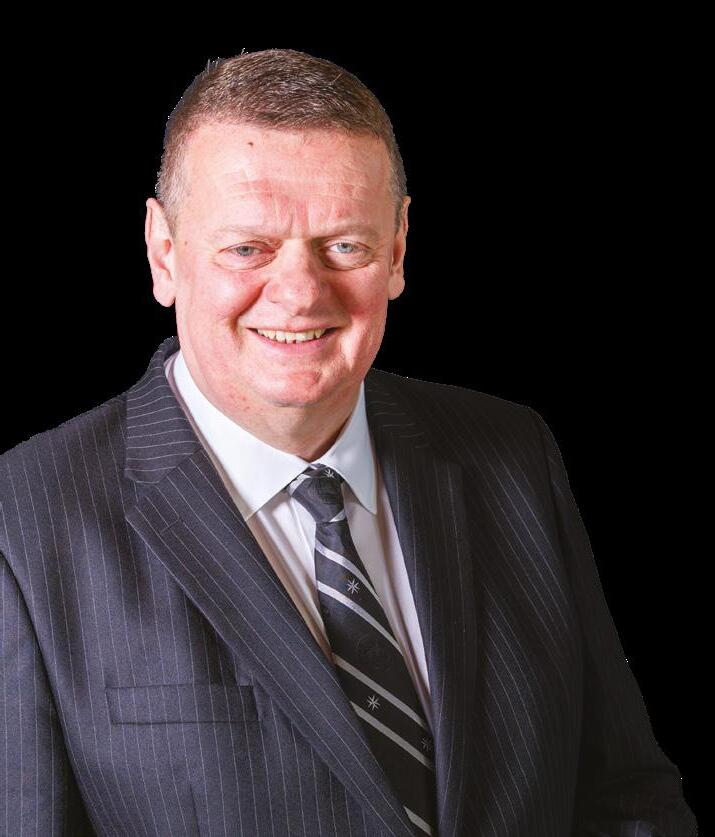
The “Provincial Pilgrims” initiative provides practical support to smaller which ensures that meetings can proceed successfully. This, however, is not about doing the work for them. Rather, it’s about assisting them to deliver
high-quality ceremonies in order to ensure that we give our candidates the best possible experience when they come into the Order.
Unlike Craft, Chapter, or Mark, where you must go through the chair before you can become a Provincial Steward, we do it in reverse. Suitable candidates can join the Provincial Prior’s Bodyguard early in their journey. It’s immersive, you participate in ceremonies, attend events across the Province, and form lasting friendships. This is by design rather than by accident and fosters a culture of deeper involvement and exposure to Provincial operations at an earlier stage.
In my experience, the answer is often yes – I find that very few people join and feel that it isn’t for them. Most love it because it’s so distinct from other Orders. It transports you from the templebuilding narratives to the medieval period, via a highly interactive and visually stunning ceremony. It’s not just another apron or ritual; it’s an experience.
Without the Craft and the Royal Arch, Masonic KT simply wouldn’t exist as we would have no candidates! This is why we emphasise the need to support our Lodges and Chapters. Our
requirement for candidates to profess the Trinitarian Christian faith means that not all Masons are eligible to join, but this is not meant to be in any way disparaging of other Faiths, and we take pride in our diversity and culture. My offer to attend and deliver a talk on the Order remains open to any Lodges or Chapters who may be interested.
We have a highly active social program. In addition to our Annual Church Service at Waltham Abbey, we recently held an extremely popular Away Weekend in Windsor and our annual St George’s Dinner at Cheshunt. We’re organising a hog roast and family fun day in June. These events involve families and non-Masons too - it’s not about recruitment, we want people to feel welcomed and involved.
We have made a fantastic start, raising £40,000 in just two years towards our challenging target of £100k by 2033. Whilst we still have a long way to go, I am incredibly grateful for the support that we have received so far, which has come from our members, Preceptories, other Orders, social events, and merchandise sales. We donate £10k a year to sponsor Maysoun, an Ophthalmic Nurse from the St John of Jerusalem Eye Hospital Group. Despite the extreme difficulties caused by the current conflict, this vital and lifechanging work continues.
www.ktherts.com
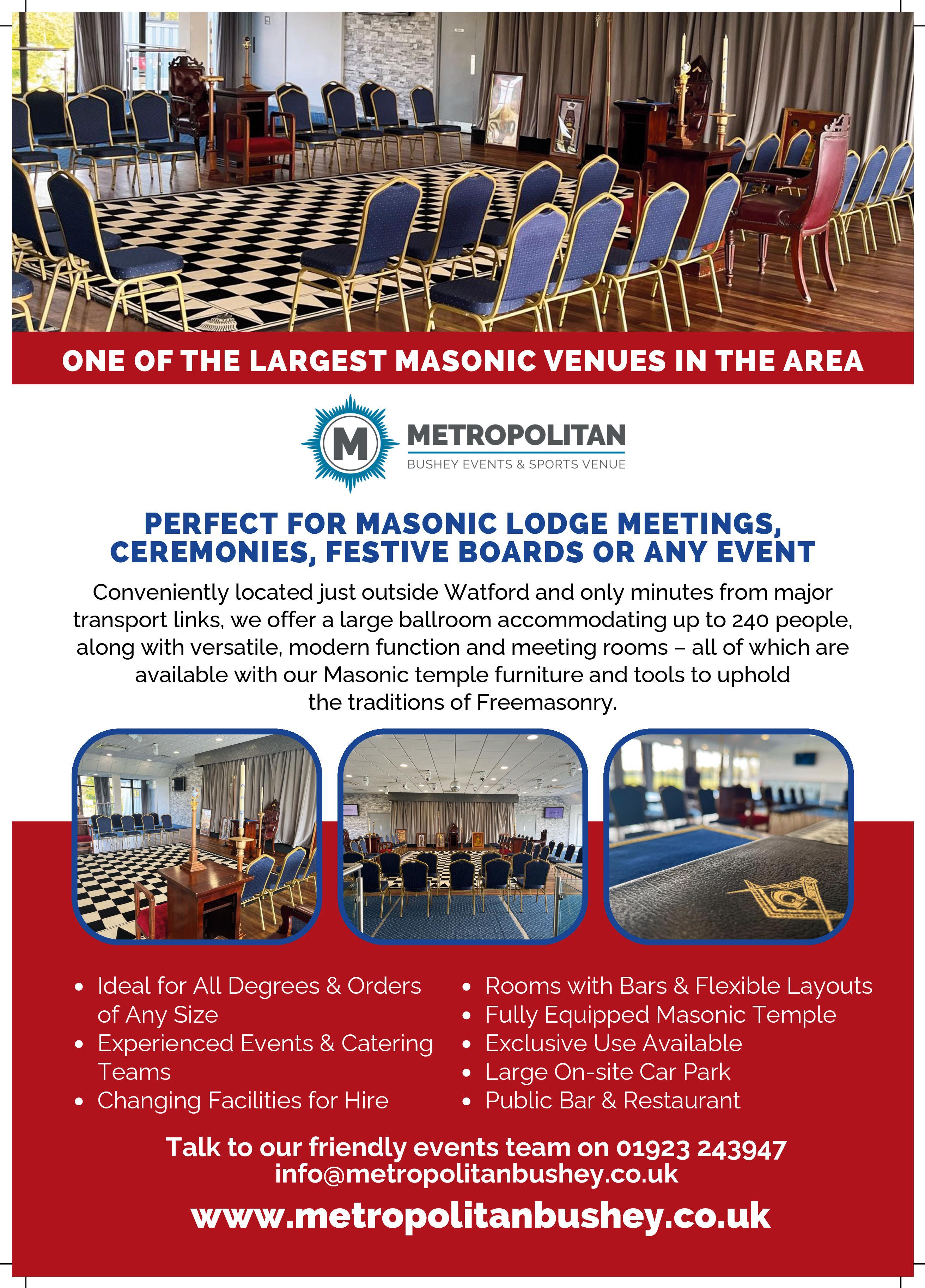
Anno Lucis talks to Martin Francis, Chairman of the 2030 Festival for
In two words: very enjoyable. It’s like turning 50, you don’t feel drastically different from 49! I like to think I’ve remained approachable, warm, and friendly. I enjoy making new friends, and I really treasure the company of old ones.
At meetings, I make a point of seeking out younger or newer brethren to ensure they feel welcome and included. I remember being in their shoes, in awe of senior figures like the Revd Neil Collings and Colin Harris. Listening to their insights shaped my own view of Freemasonry.
Absolutely. There are still lodges where members aren’t fully aware of what the Festival supports. The Masonic Charitable Foundation (MCF) has now been around for nine years, yet some brethren still don’t know where it’s based, how it works, or that it’s funded largely by Freemasons, and income from investments.
The work it does is extraordinary. I’ve had the pleasure of working with its various teams, Relief Chest, Fundraising, and especially the Charity Grants Team, who are currently supporting nine small and mediumsized charities in Hertfordshire. Larger grants have gone to groups like Mudlarks in Hertford and Playskill in Watford, which supports children with serious disabilities during their early years. The feedback from families has been incredibly moving.
Yes, the MCF awarded £99,600 to nine local charities, with some grants spread across several years. One example is Teens Unite Fighting Cancer in Hoddesdon, which received nearly £60,000 over two years. I’ve met some of the young people they support, survivors of serious illness. Seeing how our donations contribute to their physical and emotional recovery was profoundly humbling. They were full of optimism.
The grants to individuals are means-tested, so if you’re financially secure, you’re expected to manage your own needs. But for those who are struggling, MCF can make a real difference. One brother I know received support for a knee operation that helped him return to work. He wasn’t in a position to repay the cost, but he was among the first to sign up for the Festival out of gratitude. That gesture spoke volumes.
The focus shifts. Each Province is asked to support the MCF through its Festival appeal, and here in Hertfordshire, we rise to the challenge. Together with Paul Kelly and the rest of the team, we’re encouraging lodges to engage fully and give generously.
If every member contributed just £10 a month via regular giving, every lodge could achieve Grand Patron status. That leaves alms collections and other efforts free to support causes on the Master’s list.
They might feel like they’re on their own, but they’re not. Most are enthusiastic, and ideally, they’ll get a good handover from their predecessor. The MCF website is a brilliant resource. There’s a full guide for Charity Stewards, alongside quick how-to videos covering Relief Chest registration, online donations, and the e-voucher scheme.
Paul Kelly and I are always happy to meet locally and walk stewards through the basics. If you’re enjoying the role, you’ll do it better, and we want it to be enjoyable.
A Festival year brings more to do and more ways to contribute. But it’s not all about money. Some brethren can’t give financially, and that’s okay. Others can help in different ways, volunteering, organising events, or simply spreading the message. Take Bob Barnard at Halsey Hall, one of our more senior members, his energy, enthusiasm and commitment, alongside others, has transformed charitable giving at Cheshunt.
The 2030 Festival isn’t just a financial target, it’s a collective commitment. It’s proof that when Freemasons pull together, real lives are changed. Whether you’re giving a little, giving your time, or encouraging others, every contribution counts. The countdown is on, but the future looks bright.
Setup Regular Giving

•
•






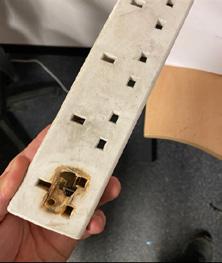


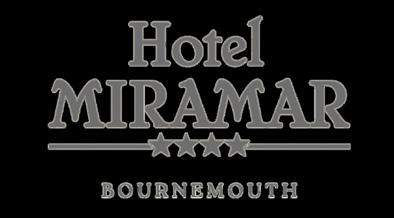
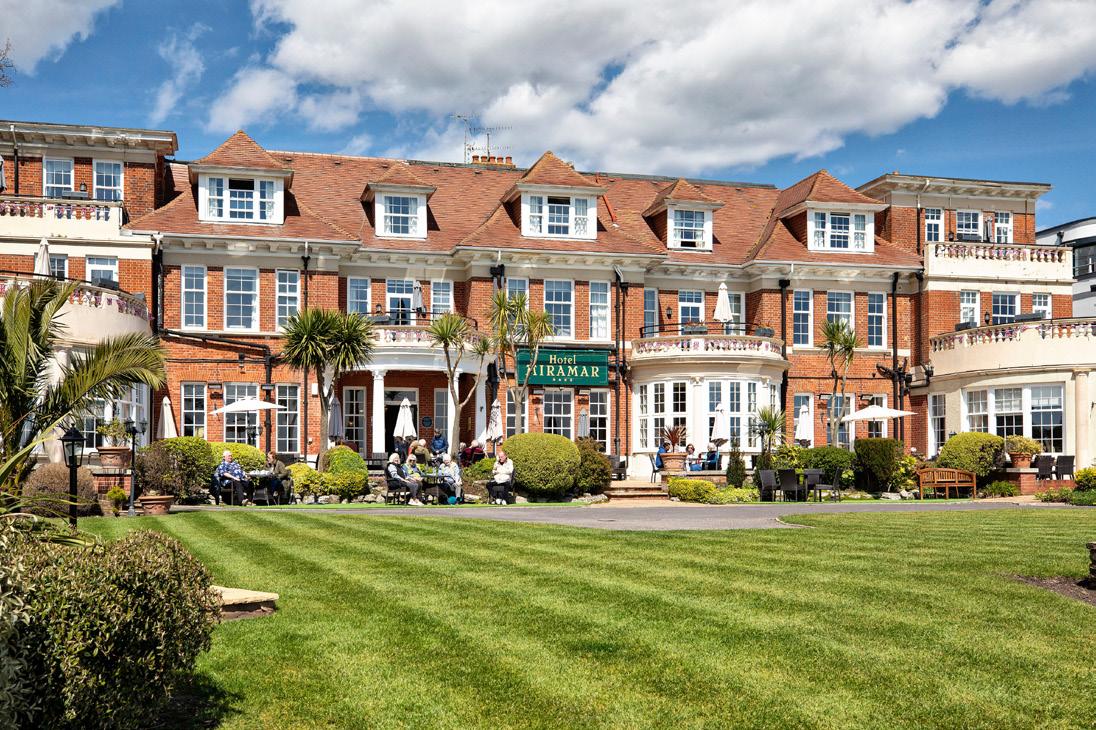


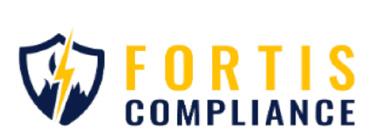
I joined the police cadets at the age of 18 in 1966, and in 1967 I became a regular police officer. I served for 30 years, retired as a Superintendent, having had my own police division with almost 300 staff. I stayed with them in civilian roles before retiring when I turned 65. I had a smashing career and did everything I wanted to do.
When I was initiated, my father’s best mate was Junior Deacon, but he wouldn’t swap so Dad did the charge instead of taking me around! I used to attend ladies’ nights and lodge social events and after about three years I said to Dad, ‘this is wonderful, how do I get in?’ And he said, “I thought you’d never ask!” because in those days, the rules prevented masons from asking others.
I was initiated 43 years ago, into Iceni Lodge at Letchworth. From my early years, I had been regularly visiting Hertford Lodge, so after my Dad passed away in 2010, I later left Iceni and joined Hertford where I’m now DC and Preceptor.
I’m a late developer! But what’s happened to me since active rank in 2019 has been beyond my wildest dreams. I never ever thought I would get anything like that. I just wish my dad was still here to see it. I felt extremely honoured but humbled as well. I accepted it and told my wife who has supported me all the way through my journey.
My portfolio will be membership, retention and Hermes, so I’ll be working with Dan Thurlow on the membership challenge. The four areas that we’re addressing are Attract, Engage, Retain and Retrieve. In my year as an active Junior Grand Warden, that’s what I’ve been pushing towards lodges. You must look at these areas and find ways of actually attracting new members and I’m very positive about the future. There’s a lot of work we hope to do to support lodges and help them in those four areas and it’s exciting times ahead.
What struck me before I actually came in was the friendship, the camaraderie, the way I was received by all the members. That has continued and I’ve made some brilliant friends that I would never ever have met if it wasn’t for Freemasonry.
When you go to lodges and the festive board, it can be vibrant and really enjoyable. To me that’s what Freemasonry is all about. We’re all together enjoying each other’s company. I love the ritual as well - I always have. I’ve said to people there’s nothing more satisfying than learning a piece of ritual and then delivering it in a lodge meeting.
Freemasonry is our hobby, like any hobby, you’ve got to enjoy it and you’ve got to have some fun as well.
40% of our members don’t attend meetings so we’re coming up with some actions that we can take with the Lodges to reduce that number and get more of their members actually attending.
For example, I was an official visitor at a lodge last year at an installation. The IPM usually presents a warrant and a Book of Constitutions but they had two entered apprentices do it. As a result of that, at our Installation in January, I got two Master Masons to do it. That’s how you create engagement.
You’ve got to engage your members as much as you can in the ceremonies. Split them up and have multiple start times with the business items being dealt with first so that late arrivals do not miss the ceremonies. I think that’s key. Freemasonry always needs to adapt and change in line with the community and society around it.
There’s thousands of men out there who know absolutely nothing about Freemasonry. We need to tap into them, but the right ones, telling them what we’re about.
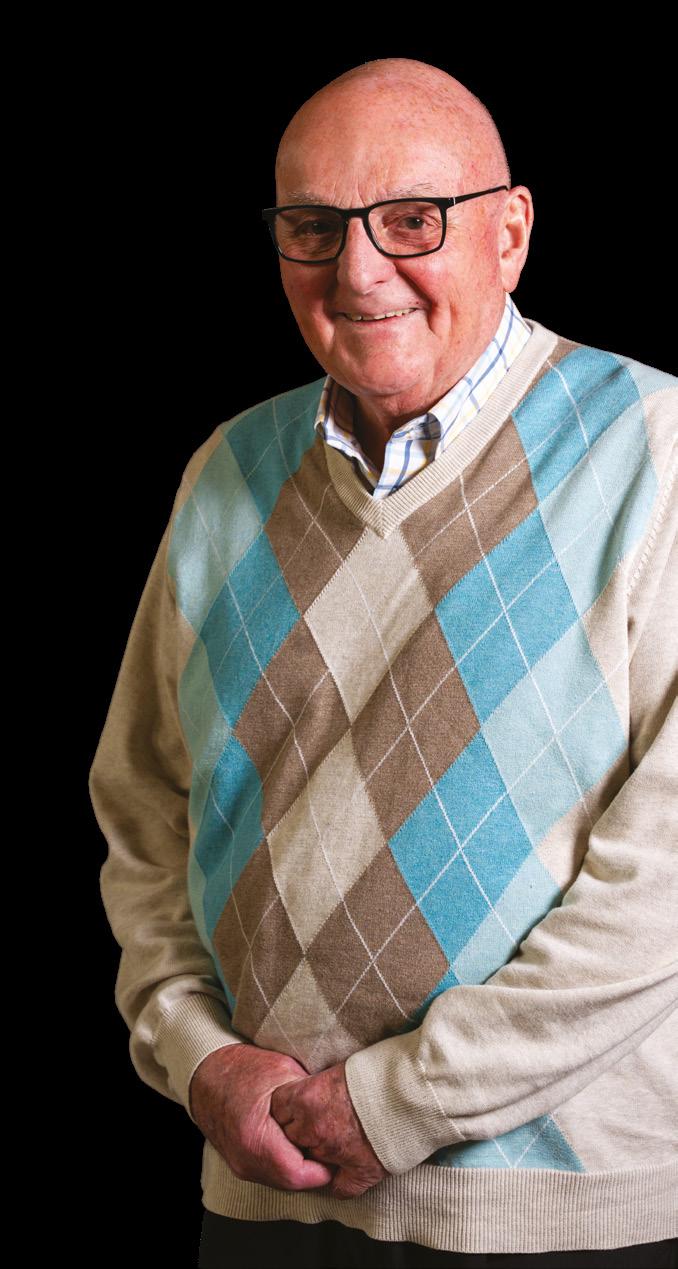
Hertfordshire Freemasonry embarks on an exciting new chapter with the recent appointment of Mark Purtow as Assistant Provincial Grand Master. Mark admits the news was entirely unexpected, saying: “It was a surprise when I was asked, totally unexpected, but I was absolutely delighted.” His enthusiasm sets the stage for a vibrant and dynamic future.
Having proudly served as a provincial officer since 2013, Mark will soon set aside the provincial wand he has held for twelve memorable years. Reflecting on this transition, he remarks: “That’s definitely going to feel strange, something totally different for me”
In his new role as APGM, Mark will oversee the Fleet House Light Blues Club, an area he passionately believes offers tremendous opportunities for growth. Speaking about the Club, Mark states, “Fleet House Light Blues Club already does great things, but there’s a fantastic opportunity to spread the word even further.”
Engagement and ongoing curiosity are at the heart of Mark’s vision for his new role, where he will also oversee Learning and Development. “I’ve always believed in daily advancement in Masonic knowledge,” he explains. “It’s essential to ensure our members truly understand and appreciate the meaning behind our ceremonies, not just perform the rituals. It’s about keeping Masonry meaningful.”
Family is integral to Mark’s Masonic experience, something he emphasises with heartfelt warmth. He fondly recalls his very first induction meeting as a provincial officer, humorously remembering: “I arrived directly from the maternity suite, still in flip-flops and a t-shirt, but ready for action, Paul Gower and Dick Knifton regularly remind me of that memorable day!”
Mark credits his wife for her invaluable support: “Lucy is incredibly supportive, not only allowing me to spend so much of my time with Freemasonry, but also helping me get our children involved and interested. It really makes all the difference.”
One of Freemasonry’s great joys for Mark has been the unexpected connections it brings. He recalls a remarkable occasion: “I once attended a lodge meeting and ran into someone I hadn’t seen since primary school. You really don’t get moments like that anywhere else.” Such experiences underline Mark’s deep appreciation of Freemasonry’s unique ability to reconnect and unite people.
Beyond his Masonic duties, Mark has built a successful career in recruitment, specialising in accountancy and finance. He believes his professional skills naturally complement his new responsibilities within Freemasonry: “My day job has always involved engaging with people, understanding their needs, and building strong relationships. Those skills directly support my goals of fostering deeper engagement
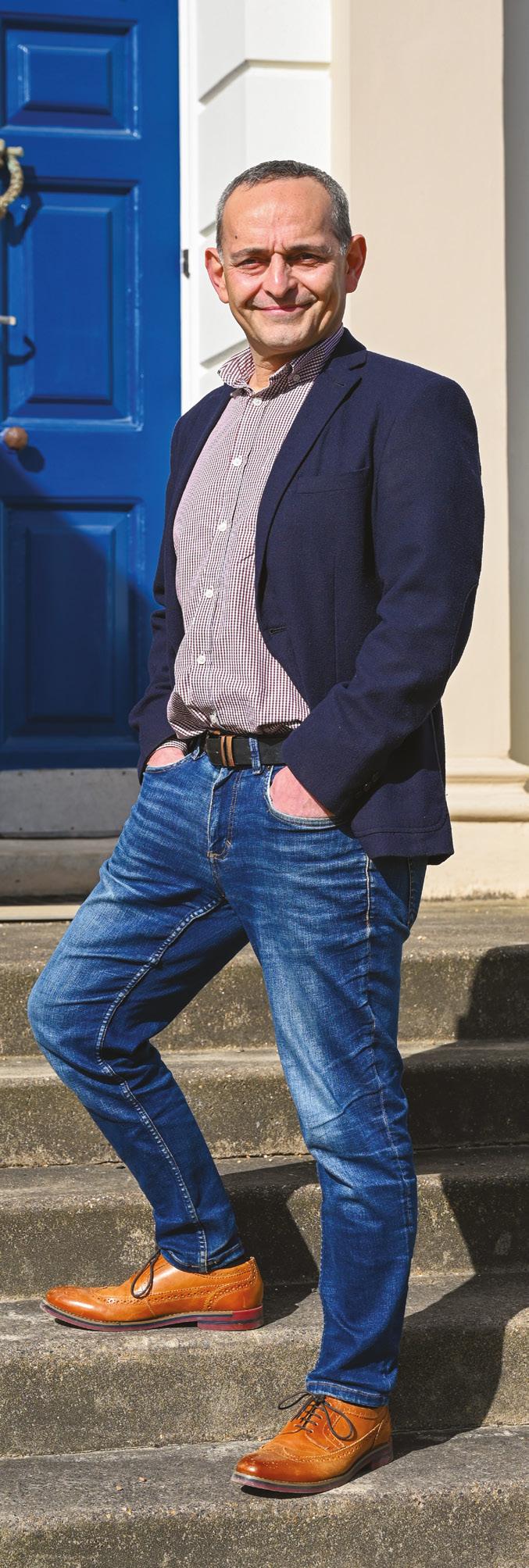
and communication within the Province.”
Alongside his new provincial role, Mark has also received the prestigious honour of the Active Grand Rank ‘Assistant Grand Director of Ceremonies’ involving ceremonial escort duties for senior Craft leaders. Approaching this with good humour, Mark notes, “I’ve got a training day coming up to learn about the ceremonial duties, and how to escort the rulers properly, so no pressure at all then!”
As he embarks on this exciting new chapter, Mark’s message to his fellow Masons remains clear and uplifting: “Enjoy your ritual, enjoy your Masonry, and most of all, enjoy meeting people. That’s really what it’s all about.”
Mike Gerschel never imagined that an ancient biblical friendship would shape his Masonic journey. Yet today, as Provincial Grand Recorder for Bedfordshire, Cambridgeshire, and Hertfordshire, Mike proudly champions the Order of the Secret Monitor, an order grounded in the legendary friendship of David and Jonathan from the Old Testament.
The Order of the Secret Monitor, also known as the Brotherhood of David and Jonathan, boasts roots even older than modern Freemasonry. Originating from ancient teachings and brought to England in 1887, its values of loyalty, brotherly care, and friendship remain timeless.
Mike describes its central story enthusiastically as “a bit of a thriller,” filled with dramatic tension and lessons that resonate today. When King Saul’s paranoia leads him to target David, Jonathan’s steadfast friendship and secret communications ensure David’s safety. This captivating narrative forms the basis of the Order’s ceremonies. Eligibility is simply that of being a Master Mason in a Craft Lodge.
Structured around three degrees, the Order offers rich symbolic experiences. The First Degree introduces candidates to the profound friendship of David and Jonathan, highlighting values like trust, vigilance, and fraternity.
The Second or “Princes” Degree deepens the narrative, exploring darker themes of triumph over adversity and vigilance. At this point he is eligible, should he so choose, to become a member of the appendant Order of the Scarlet Cord.
The Third Degree installs a Brother as the Supreme Ruler of his Conclave, entrusting him with leadership and ceremonial responsibilities across the Order and designating him a Worthy Brother.
But what truly sets the Order apart, Mike explains, is its practical focus on friendship. “Friendship isn’t just symbolic, it’s actively practised,” he explains. The Order uniquely assigns four Visiting Deacons in each conclave, whose sole responsibility is keeping regular contact with every brother, ensuring support and camaraderie beyond meetings.
Mike reflects warmly on his own journey. Initially drawn by recommendations from close friends, he found something refreshingly different in this Order, less formal, yet deeply meaningful. Members primarily wear a simple jewel symbolising their rank, making participation accessible and cost-effective.
Camaraderie extends well beyond local meetings. Provincial gatherings under charismatic leaders like Howard Markham, the Provincial Grand Supreme Ruler, and his lively deputy, John Wickes, draw attendees from across the country. Mike particularly enjoys these provincial meetings, highlighting them as events filled with warmth, humour, and genuine fraternity.
Charity within the Order also holds special significance. Instead of distant causes, the Secret Monitor primarily supports local needs, extending its fraternal ethos into tangible, meaningful action close to home. Members actively look after one another, stepping in during hardships or illness, embodying the Order’s core principle of “watchful brotherly care.”
“Joining the Order of the Secret Monitor is a profoundly positive step,” Mike confidently concludes. “Members seldom leave; most remain devoted, growing ever deeper in their appreciation of its values and friendships. Reflecting the enduring loyalty of David and Jonathan, this is one Masonic order where ancient values continue to inspire genuine friendships in the
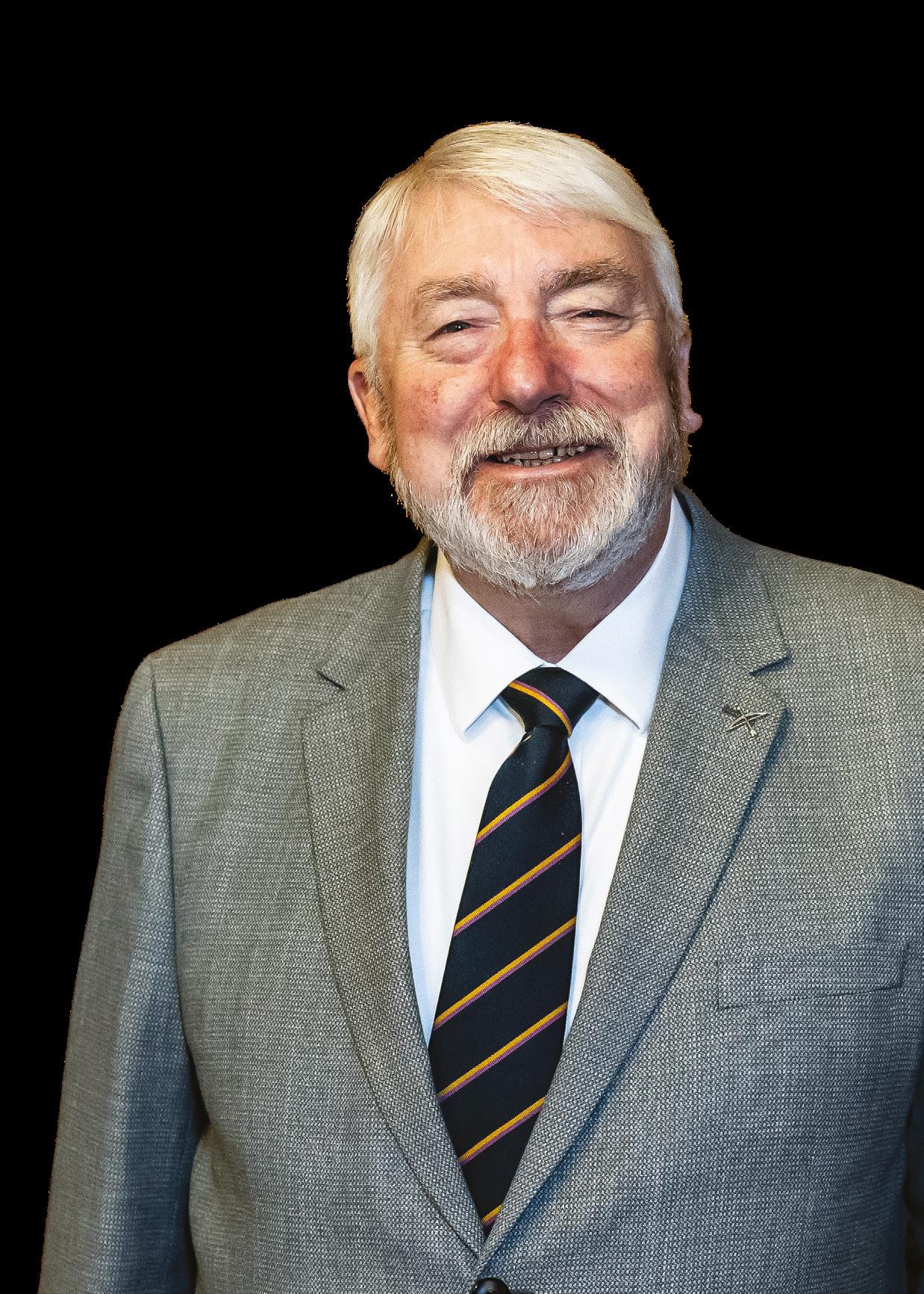
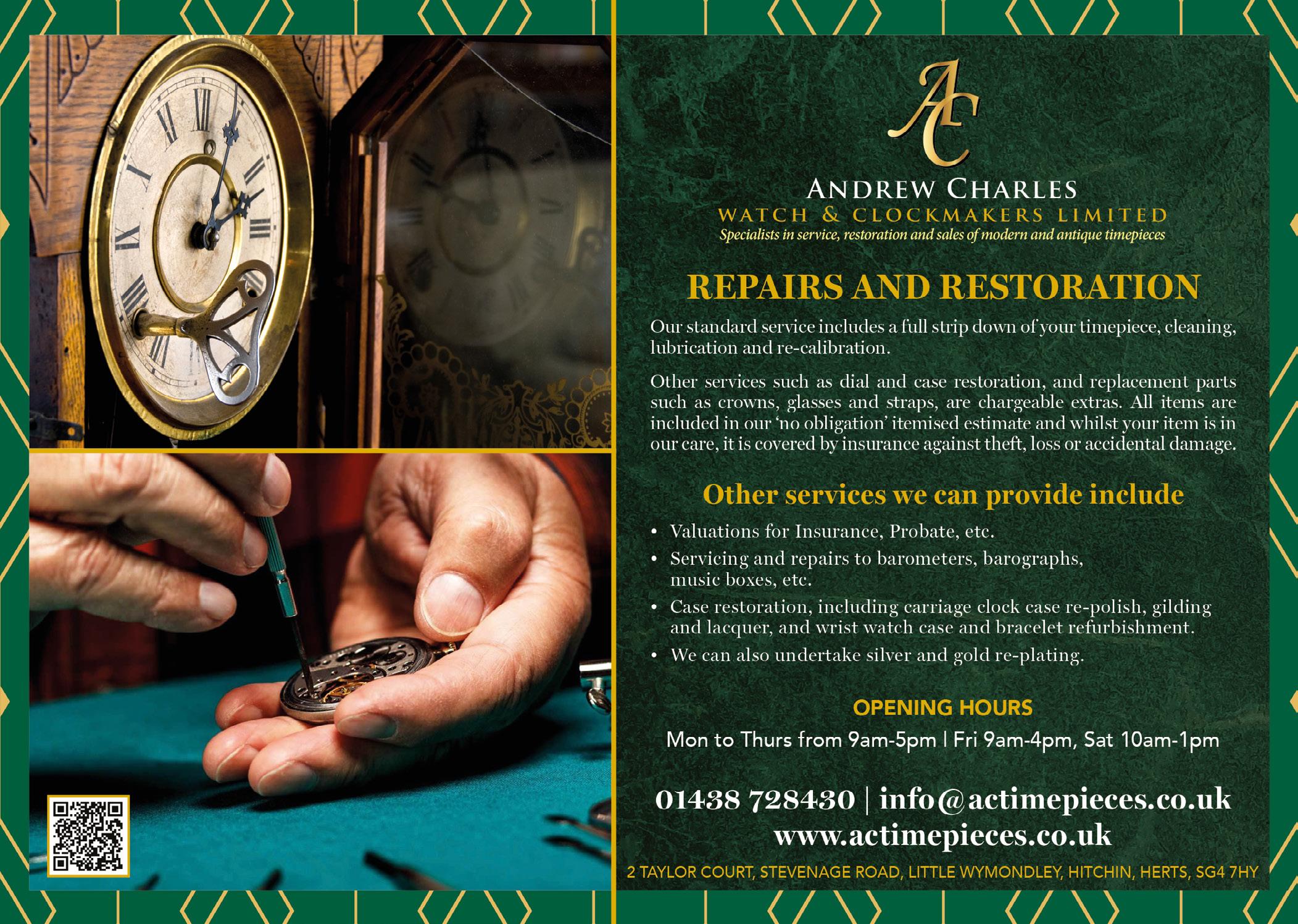


She trusted the agent that sold 40% more homes over £1m than anyone else.
* Source: TwentyCi UK exchanged data 2024 *

Waytemore Castle Lodge, alongside fellow Freemasons and guests, recently raised an impressive £16,000 for the Teens Unite Cancer Charity, supporting young people aged 13–24 fighting cancer.
The highlight of their fundraising was a spectacular Ladies Festival held at Down Hall Country House Hotel in April. 175 guests enjoyed a lively and memorable evening, combining tradition with a modern, inclusive spirit. This marked a welcome return for the Lodge’s Ladies Festival, which had been absent for several years.
Founded in 1980, Waytemore Castle Lodge prides itself on its friendliness and strong bonds among its subscribing members. Meeting five times a year, the Lodge blends ceremonial seriousness with a warm social environment, qualities that were on full display during the festival.
The event was championed by Worshipful Master Enrico Nardelli and his wife Victoria, whose enthusiasm and vision brought the evening to life. Victoria, known for her sociability and connections, took the lead in organising the evening alongside a small committee, modernising the traditional format while retaining the event’s heart.
Guests enjoyed a drinks reception with a magician and live music,
followed by a three-course meal in the grand ballroom. The evening featured a silent auction and a lively raffle, with prizes such as Tottenham memorabilia and other luxury items raising thousands of pounds. Entertainment was expertly managed by a professional Master of Ceremonies, helping to create a vibrant, relaxed atmosphere.
A particularly striking feature was the diversity of the crowd, with many younger guests attending thanks to a core of younger lodge members. This infusion of fresh energy helped make the evening feel dynamic and accessible, showing a modern, welcoming face of Freemasonry to those less familiar with it.
Choosing Teens Unite as the nominated charity was a personal decision influenced by Victoria’s connections with the cause. The charity also shares historical ties with Freemasonry in Hertfordshire, having previously received a Masonic Foundation (MCF) grant. The decision resonated strongly with attendees, many of whom were inspired to support the charity further including one young guest who later ran the London Marathon in its honour.
Reflecting on the success, lodge members emphasised how the evening demonstrated the continuing value of Ladies
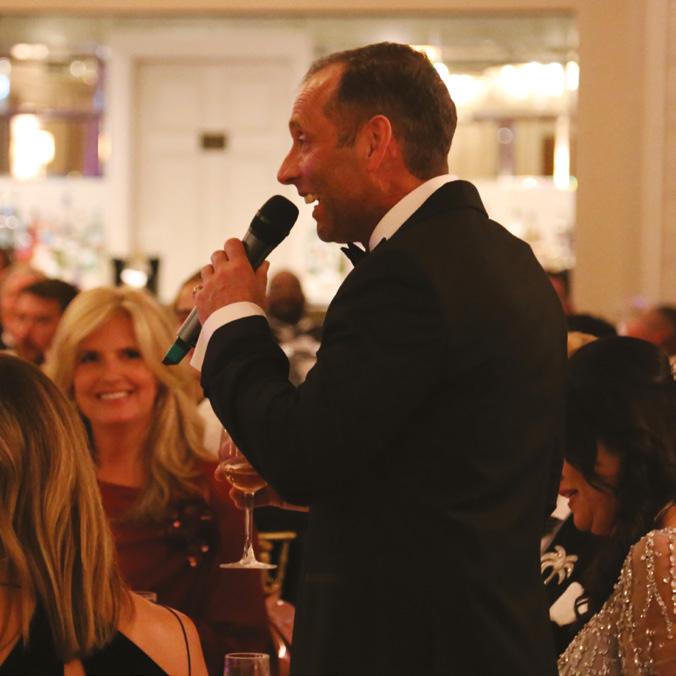
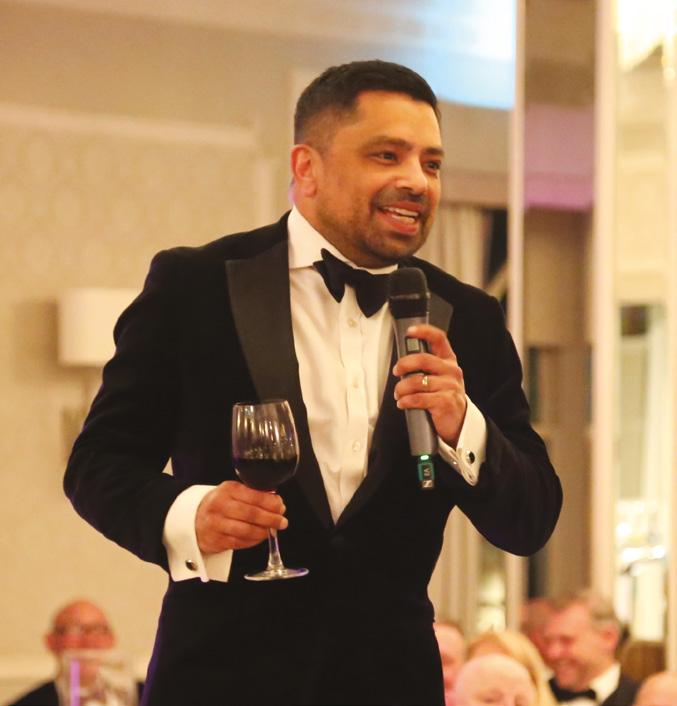
Festivals. Beyond fundraising, the event strengthened bonds among members, introduced Freemasonry to a wider audience, and proved that with the right approach, traditional events can evolve to suit modern tastes.
As Waytemore Castle Lodge looks ahead to the new Masonic year, there is a strong desire to build on this momentum and encourage other lodges to see the benefits of hosting similar events, however large or small.
This celebration not only raised vital funds for an important cause but also left a lasting impression on all who attended, showing the enduring power of Freemasonry’s values of Service, Friendship, Integrity and Trust.
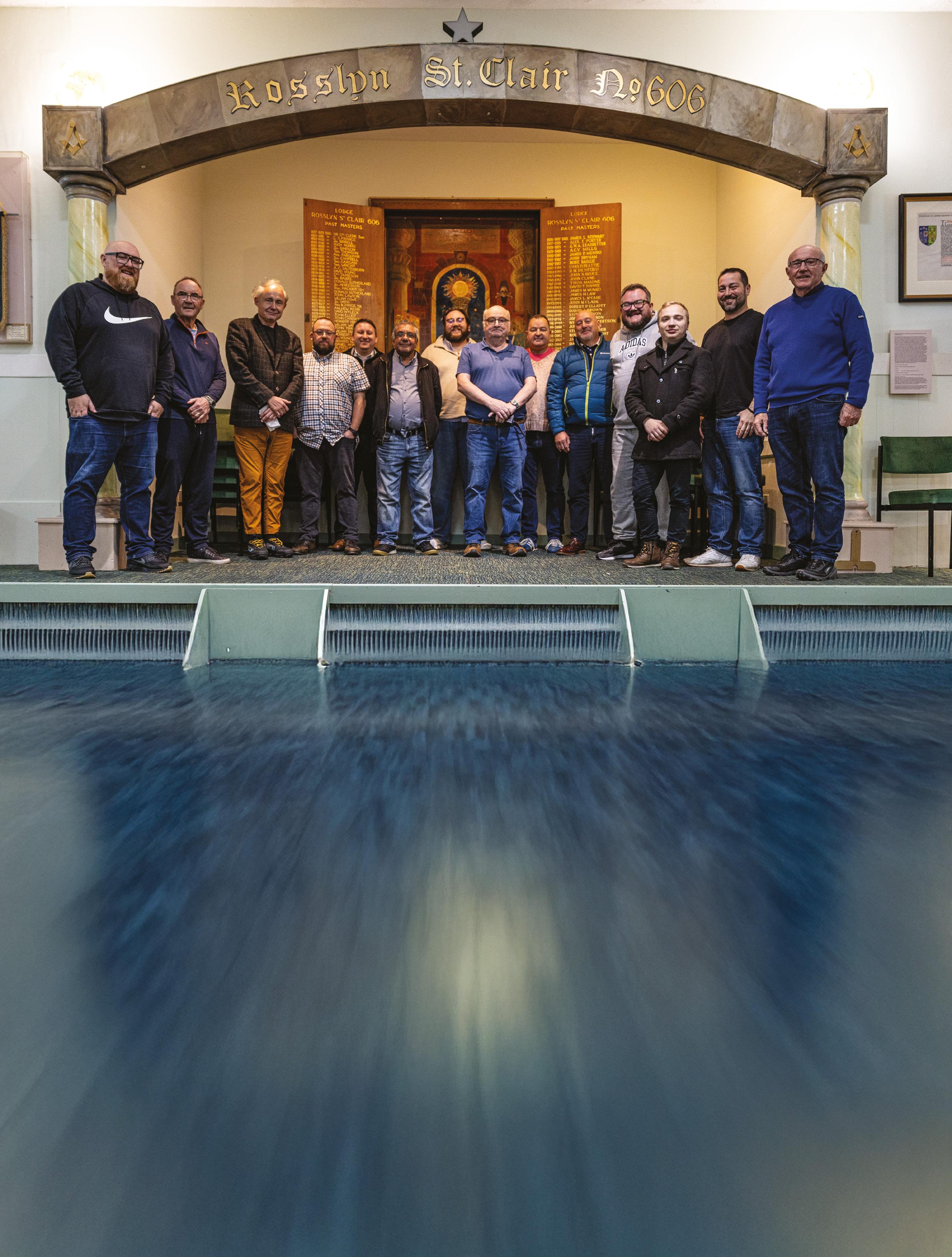
Stepping beyond their mother lodges, junior Freemasons in Hertfordshire are finding adventure and camaraderie through the Fleet House Light Blues Club (FHLBC). This club encourages its members to explore Freemasonry in fresh and exciting ways. One month they might be hopping on bicycles for a guided Masonic tour of London – an easy-going ride through backstreets to see landmarks like Freemasons’ Hall and Mark Masons’ Hall, with plenty of stops at historic pubs for refreshment and laughter. On another occasion,
these Light Blues are out on the water at Stanborough Lakes, trying paddleboarding and kayaking for the first time, some even literally taking the plunge (much to everyone’s amusement, especially when a certain overenthusiastic Secretary needed rescuing!). Every outing, whether a casual bike ride or a new hobby, becomes an opportunity to soak up Masonic heritage and build friendships in equal measure. The spirit of exploration is alive and well in the FHLBC, turning ordinary weekends into unforgettable journeys of discovery.
Travel and discovery are at the heart of the FHLBC experience. In October 2024, a group of intrepid club members piled into a minibus at dawn, bound for the historic city of Edinburgh on a special Masonic Scotland Trip. This was no ordinary trip; it was a pilgrimage into the rich tapestry of Freemasonry. Over three days, the Light Blues visited iconic sites and hidden gems: from touring the mystical Rosslyn Chapel and wandering the wooded paths of Rosslyn Glen, to dining on traditional Scottish fayre. They even attended a Scottish lodge meeting, witnessing traditions and festive hospitality north of the border. The journey was, as promised, jam-packed with meaningful Masonic experiences and the kind of warm fellowship everyone has come to expect from the FHLBC. Each brother returned home not only with tales of ancient chapels and new friends met, but with a deeper appreciation of the Craft’s international bond. Whether trekking to Scotland or hosting a lively Burns Night supper back in Hertfordshire (complete with haggis, bagpipes, and the Provincial Grand Master’s own address to the Haggis!), the FHLBC revels in moments that enlighten and inspire. These adventures allow newer Freemasons to discover the broader world of Masonry beyond their mother lodge, sparking wonder and a sense of belonging to something timeless and grand.
FHLBC isn’t just about events – it’s about engagement, community, and coming together as a family. Even under the stars on a chilly April night, you’ll find Light Blues gathered in good cheer. In Spring 2025 the club held a charity camping weekend in Hertingfordbury,
pitching tents in support of DENS, a local homeless charity. By day, families and brethren enjoyed a relaxed barbecue and games of football on the grass, by night, they sat in a circle swapping stories, toasting marshmallows and chatting around a cosy fire pit. It was, in their own words, “a fantastic weekend of connection and laughter,” one that already has members buzzing about the next adventure. But engagement goes further than campfire camaraderie. The club’s calendar is filled with social gatherings that double as charitable initiatives. At a recent St. George’s Day luncheon, FHLBC members and friends feasted on a four-course English meal with merry musical entertainment, all while helping raise £1,500 for Watford Mencap. Another evening, they turned a fun-filled race night into over £1,200 of donations for the Masonic Charity Festival and a local hospice. These moments show the true value of the Light Blues Club to its members, it gives junior Freemasons the chance to be active, to lead and participate, and to make a real difference together.
Whether clinking glasses of ale on a brewery tour in the Hertfordshire countryside or exchanging friendly banter on the club’s busy WhatsApp group, the brethren of FHLBC are constantly engaging with one another in meaningful ways. Senior members of the province have taken notice too, often joining in FHLBC events and supporting the club, which makes younger Masons feel truly included in the wider masonic family. Every new Mason wearing the club’s signature pin badge knows it’s a conversation starter, a symbol that says: I’m part of this. In the Fleet House Light Blues Club, engagement isn’t a buzzword, it’s the core of everything they do, building confidence, friendships, and the next generation of happy Hertfordshire Freemasons.
“FHLBC isn’t just about events – it’s about engagement, community, and coming together as a family.”
Interested in learning more or getting involved? The Fleet House Light Blues Club warmly invites you to share in the experience, come explore with us, discover with us, and engage with us on this remarkable journey. www.fhlbc.co.uk

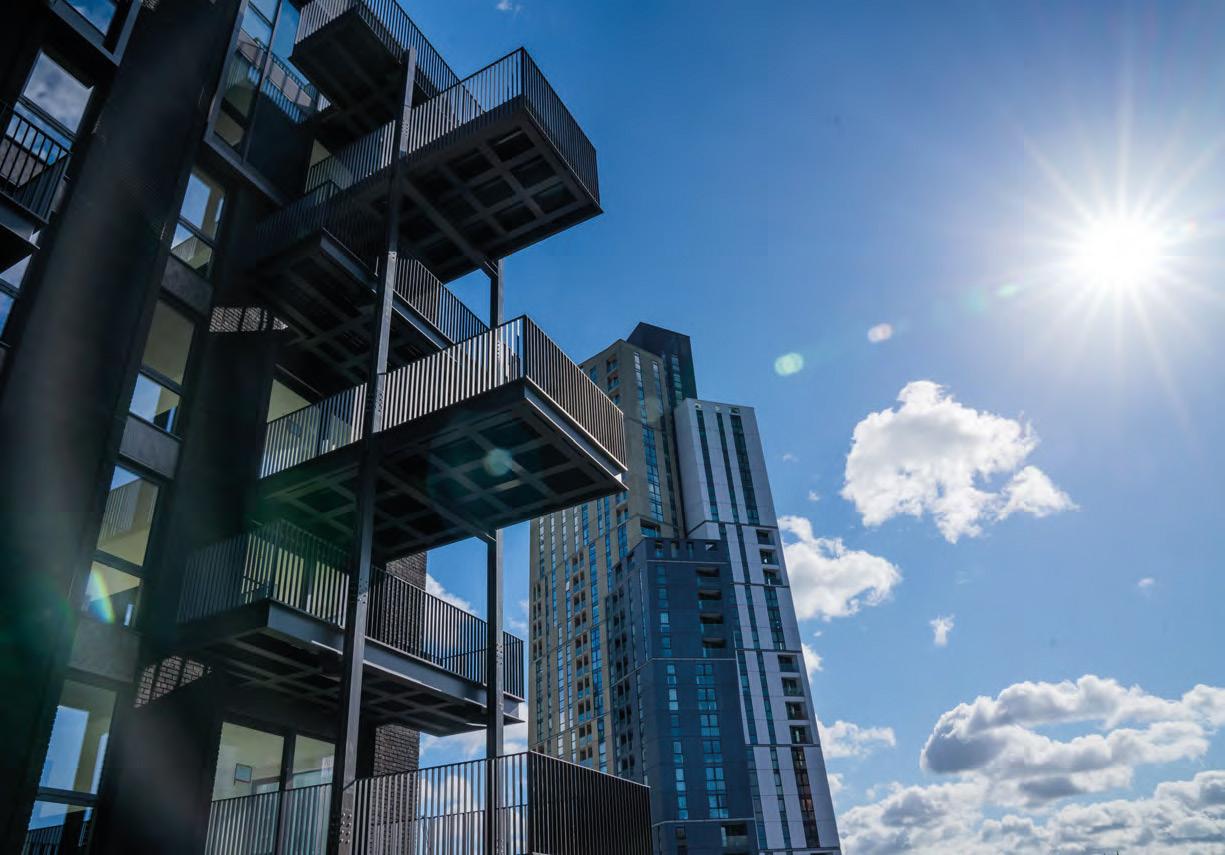
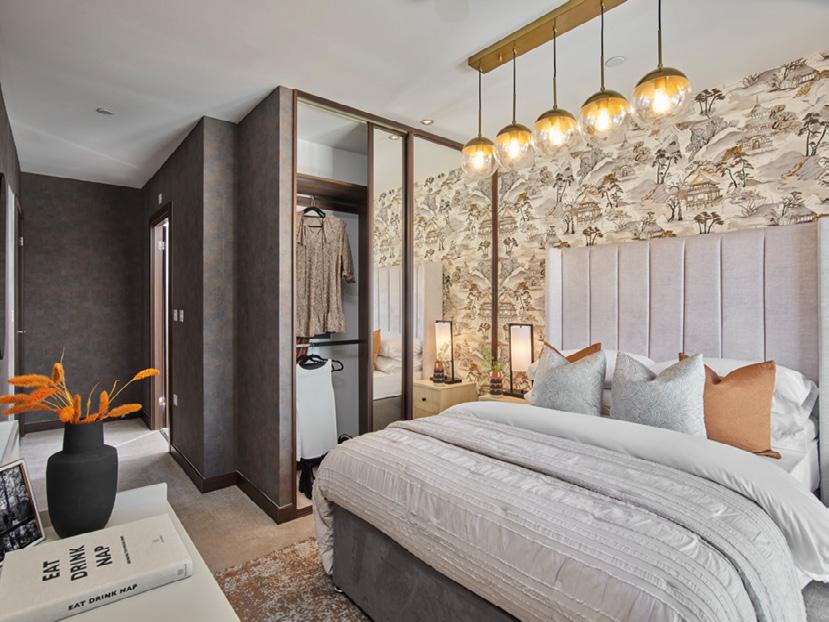
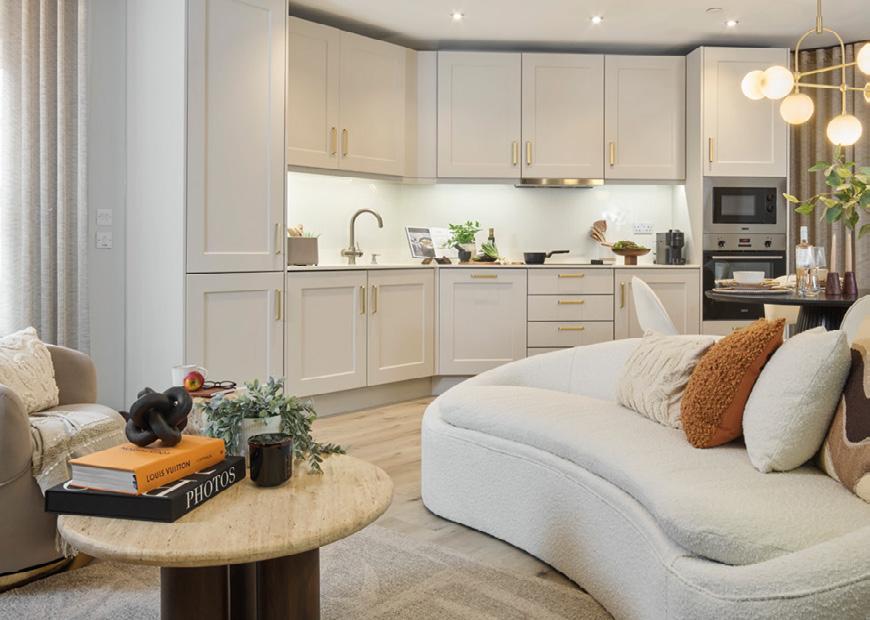



On Wednesday 25th September 2024, the Provincial Grand Lodge of Hertfordshire convened at Freemasons’ Hall, Great Queen Street, London, a memorable gathering that united brethren from across the province and beyond.
The day was marked by celebration, reflection, and renewal. In his address, Provincial Grand Master Neil Connolly reflected on the strength of Hertfordshire Freemasonry, acknowledging both long-standing service and the fresh enthusiasm of new initiates. Notably, the meeting paid tribute to the retirement of two dedicated officers, Jay Patel and Richard Phillips, and welcomed their successors, Martin Francis and Rajen Rajput.
Addressing challenges such as declining membership numbers and modern pressures on time and relevance, the Provincial Grand Master called on brethren to embrace change while preserving Masonic values. His call to view lodges as “fires that keep everybody warm” rather than “coats that keep only the wearer warm” resonated throughout the temple.
The meeting also marked the soft launch of the 2030 Festival, supporting the Masonic Charitable Foundation and the new provincial website.
The event reaffirmed Hertfordshire’s commitment to vibrant, inclusive Freemasonry, one that adapts, supports, and continues to inspire. The brethren dined together in the Grand Connaught Rooms in an affectionate and memorable evening.

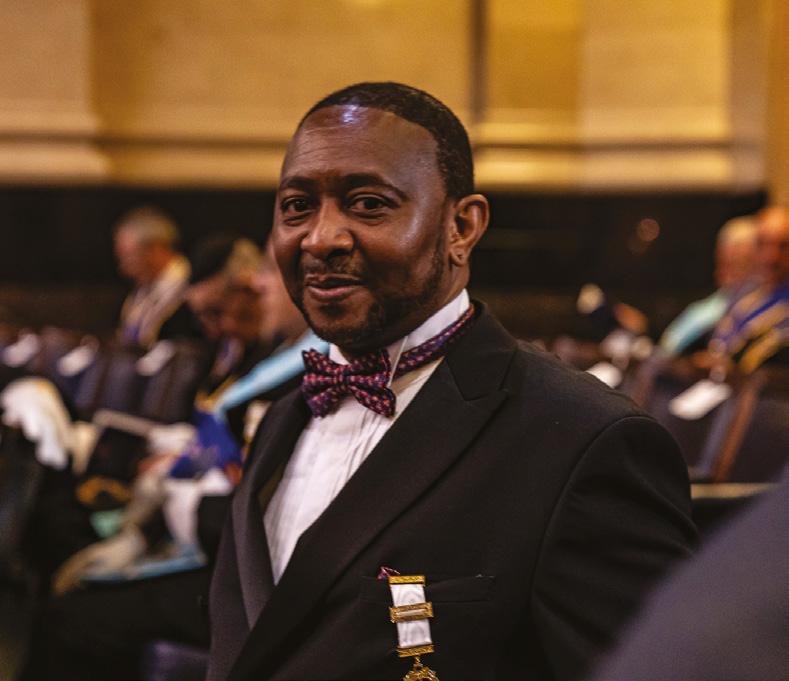
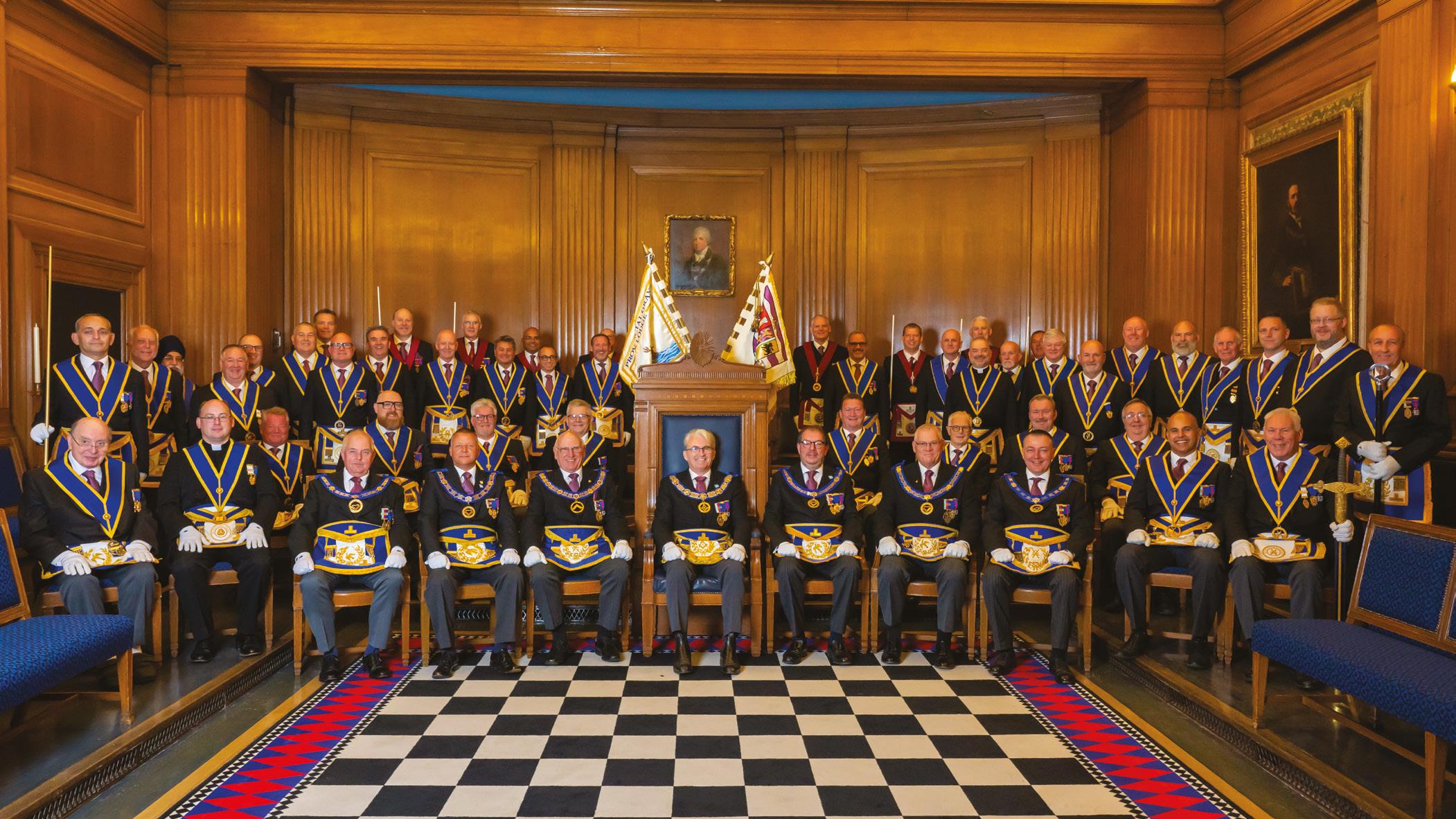



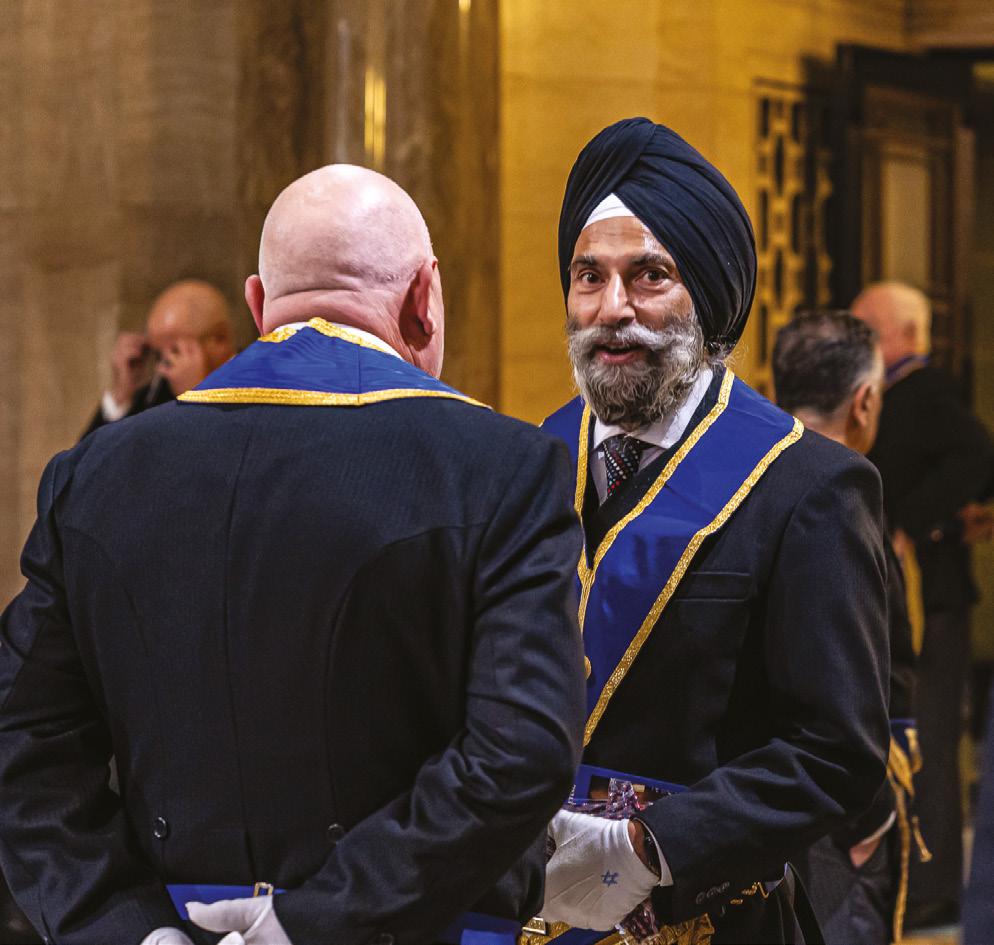
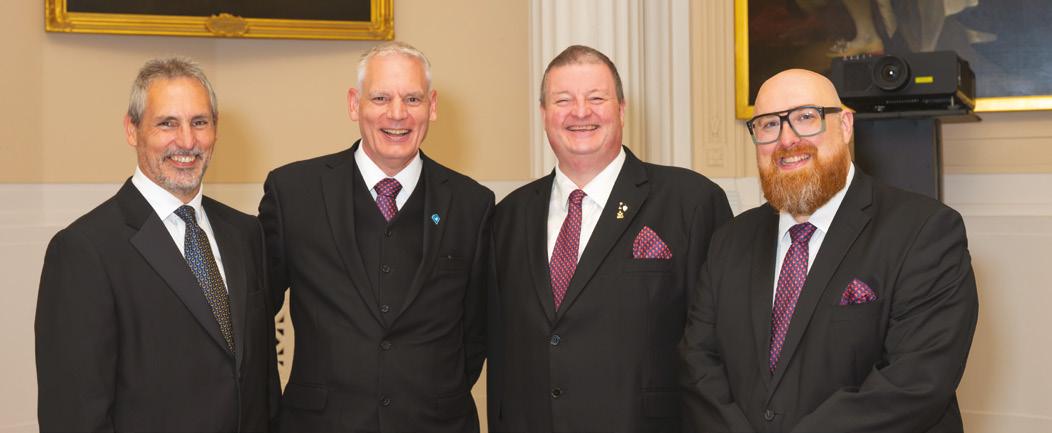
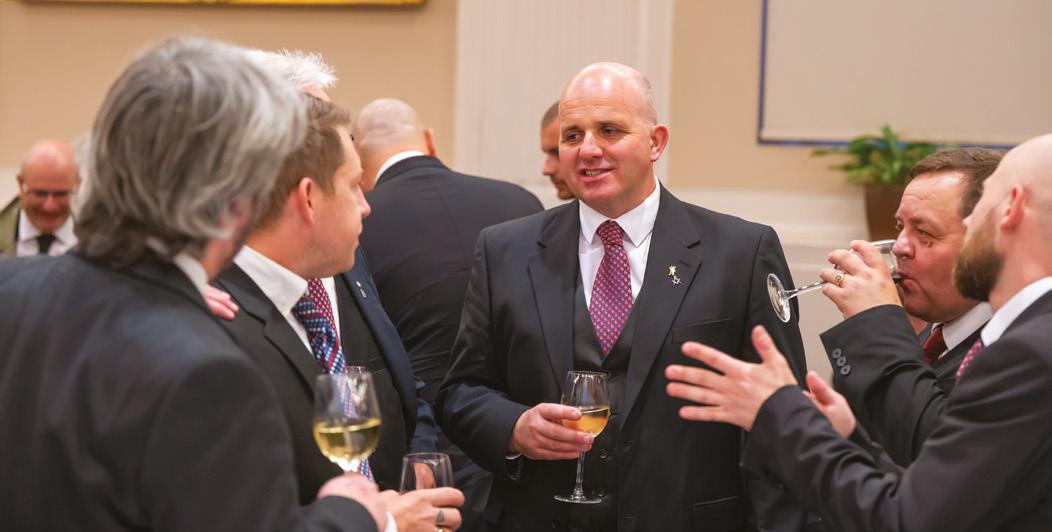

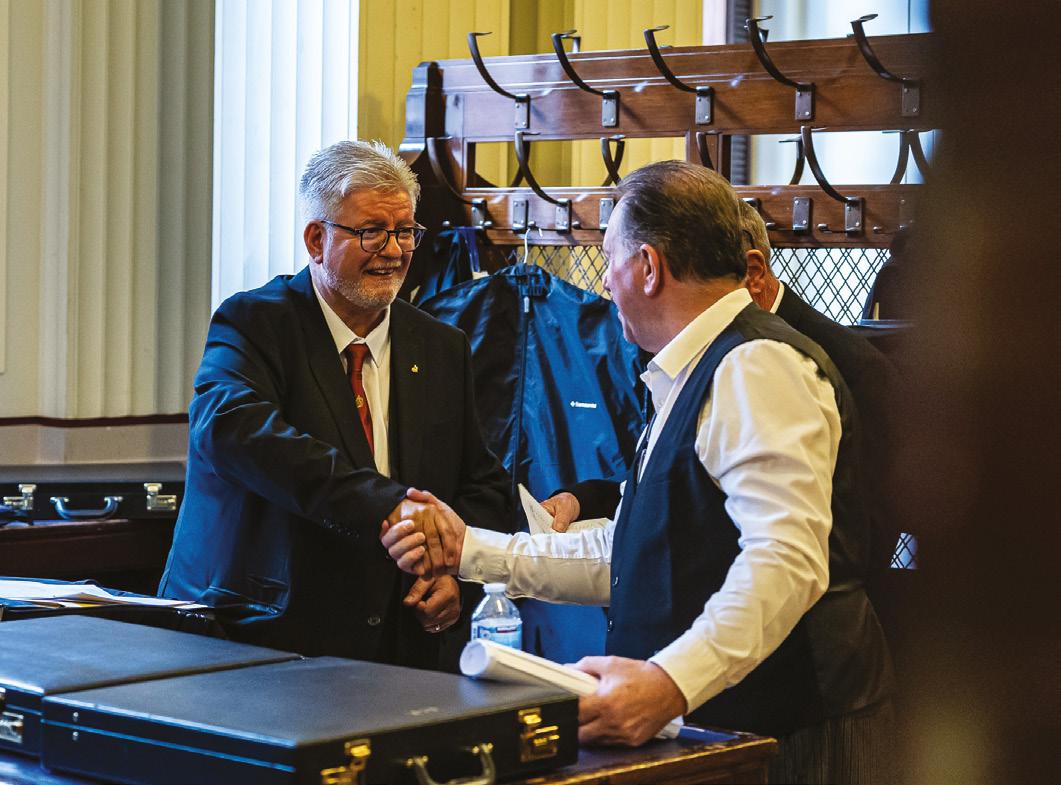
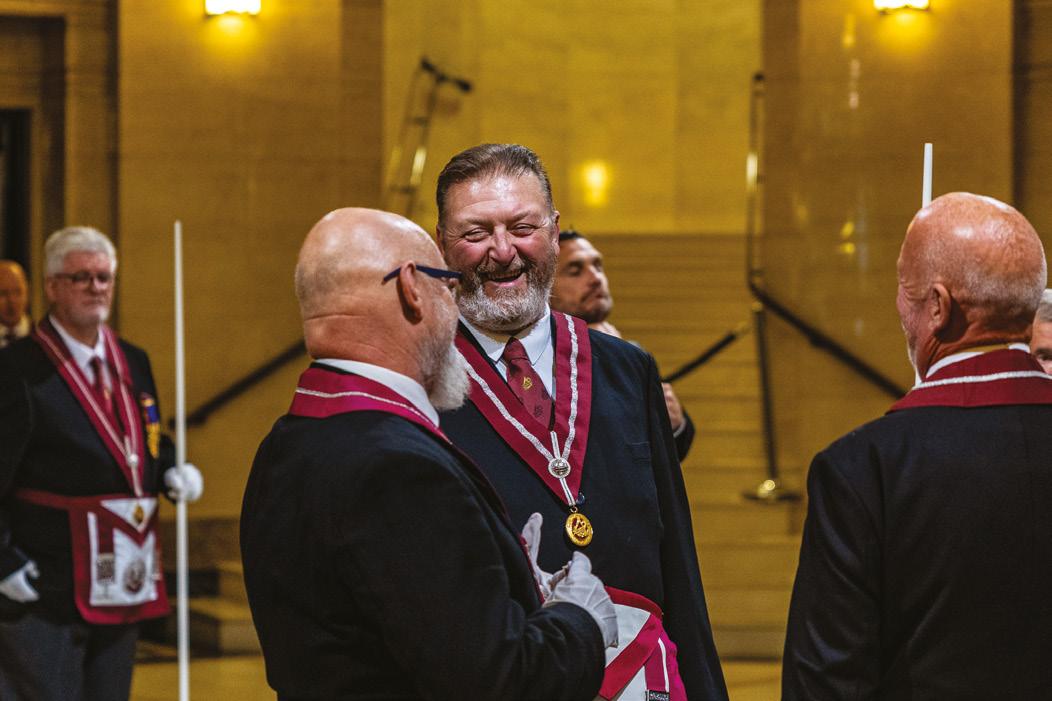

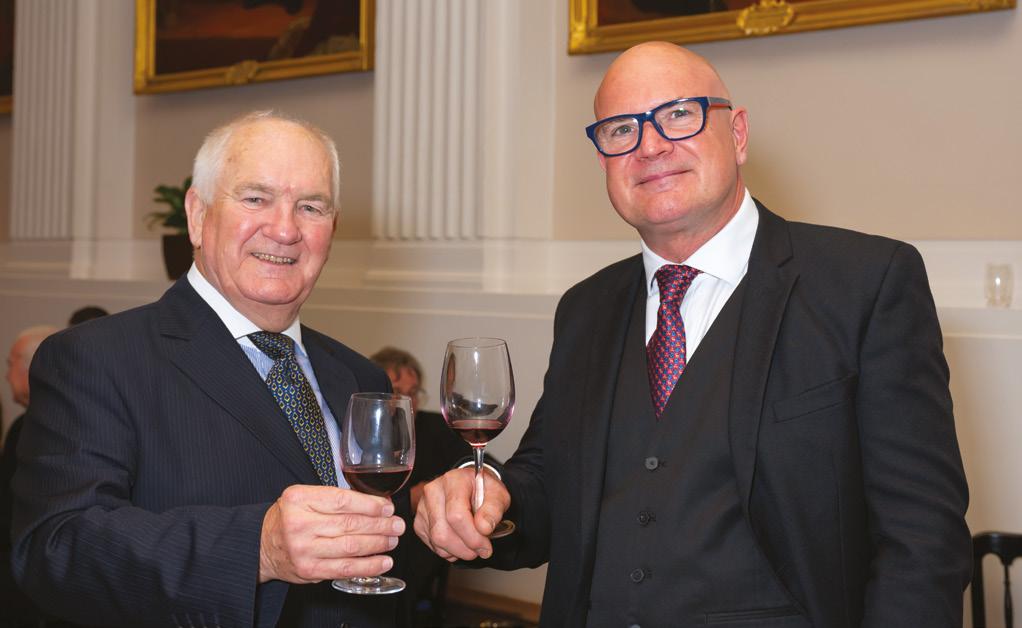


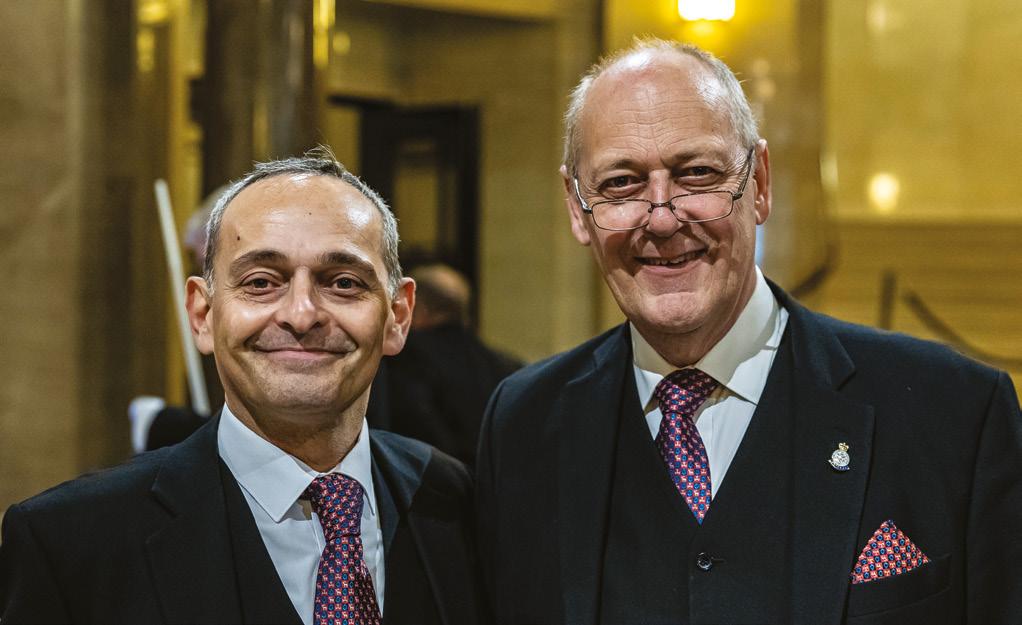
Exploring the new Hertfordshire Freemasons’ website
In today’s connected world, a strong online presence isn’t a luxury, it’s a necessity. That’s why, back in September, the Province of
launched a refreshed and reimagined website: www. hertfordshirefreemasons.org.uk.
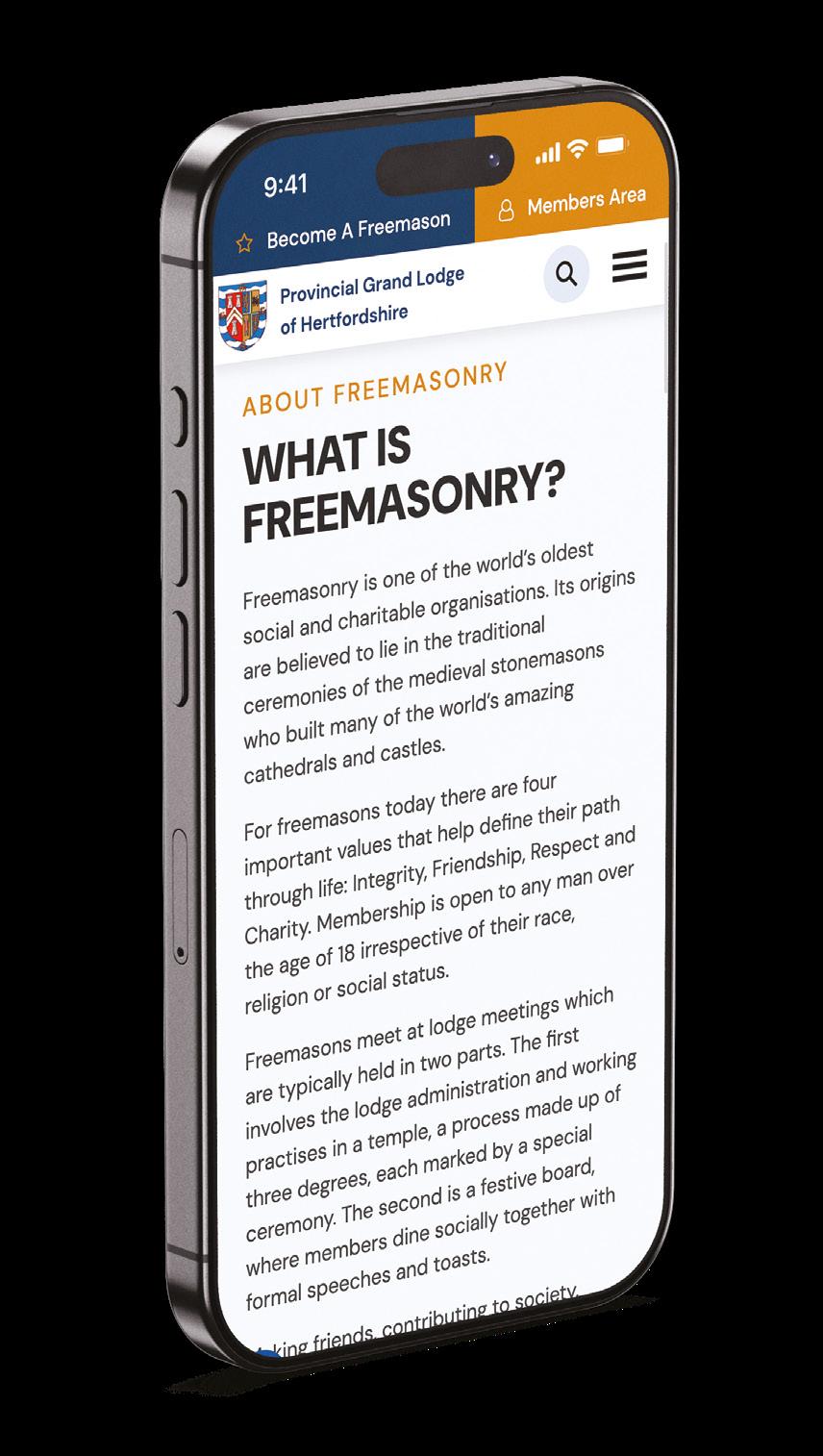
Designed to support both members and the public, the site is a modern tool for a timeless organisation. Clear, welcoming and easy to use, it reflects the values of Freemasonry while meeting the expectations of the digital age.
One of the site’s main aims is to demystify Freemasonry for those curious about who we are and what we do. The public facing pages offer a simple, open introduction to the Craft, using friendly language and real stories to encourage conversation and interest.
It’s working, the months since launch have already seen a notable rise in membership enquiries. The site is helping people find their way to us, and that’s exactly what it’s designed to do.
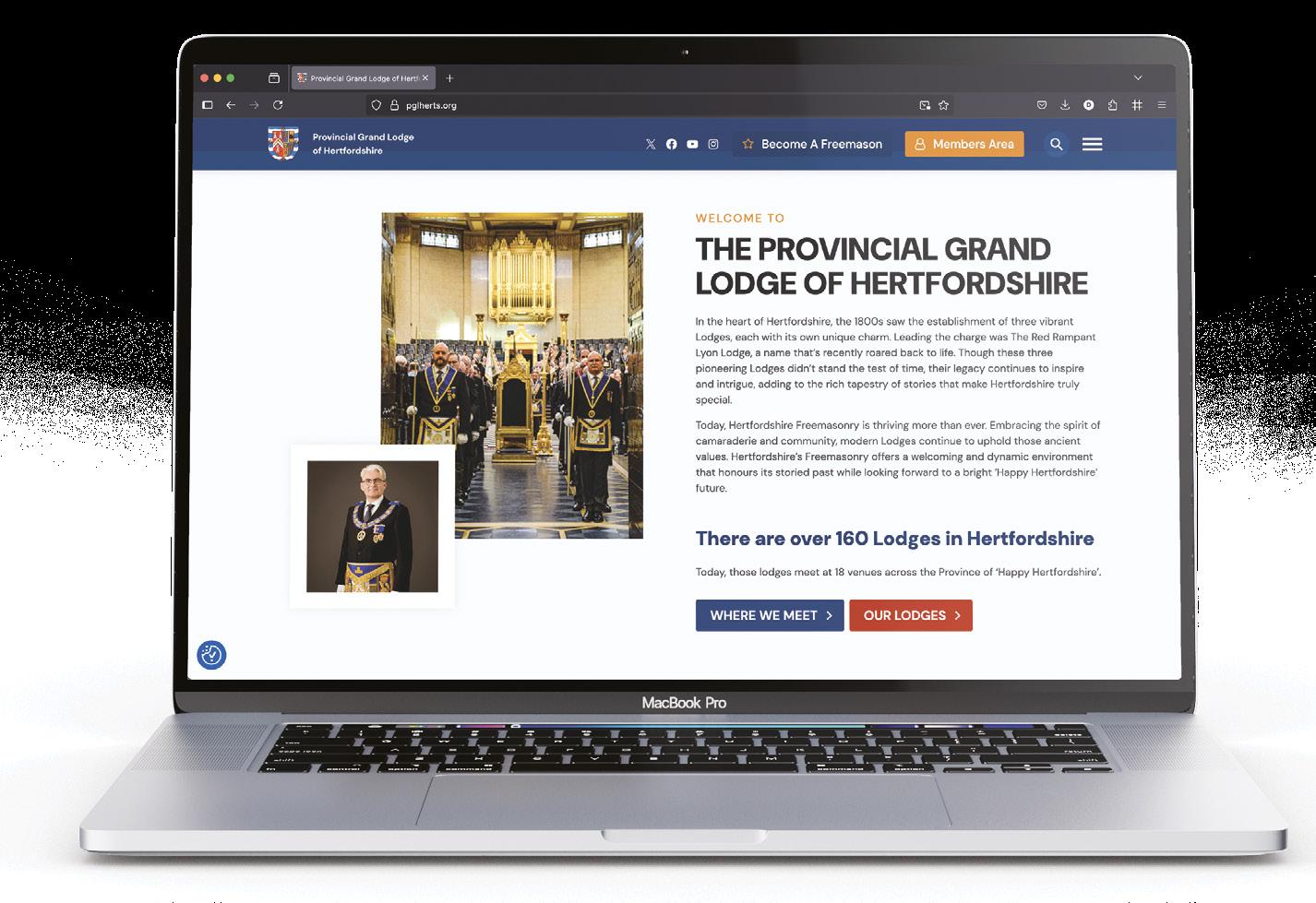
Beyond the public pages lies a dedicated Members Area, designed to make Masonic life easier and more connected. Whether you’re looking for event details, documents, clubs or our calendar, everything is in one place, accessible any time, from any device.
1. Click “Members Area” in the website menu.
2. On your first visit, choose “Create your password / Lost your password.”
3. Enter the email address the Province holds for you, and follow the instructions in your inbox. Check your spam folder if you do not receive anything. That’s it, your account is already set up and just needs activating. If you get stuck, help is always at hand via comms@hertfordshirefreemasons. org.uk
This site is more than just a digital facelift. It’s a working tool, one that supports our current members while extending a hand to future ones. In a time when most people turn to the internet for answers, it’s important that Hertfordshire Freemasonry is both visible and approachable online.
We hope you’ll take time to explore, log in, and use the site, and when the moment feels right, share it. After all, Freemasonry has always been about connection. Now, we have a better space for it.


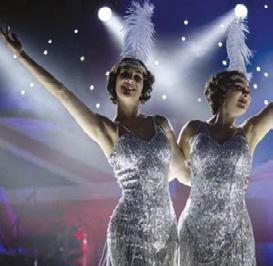

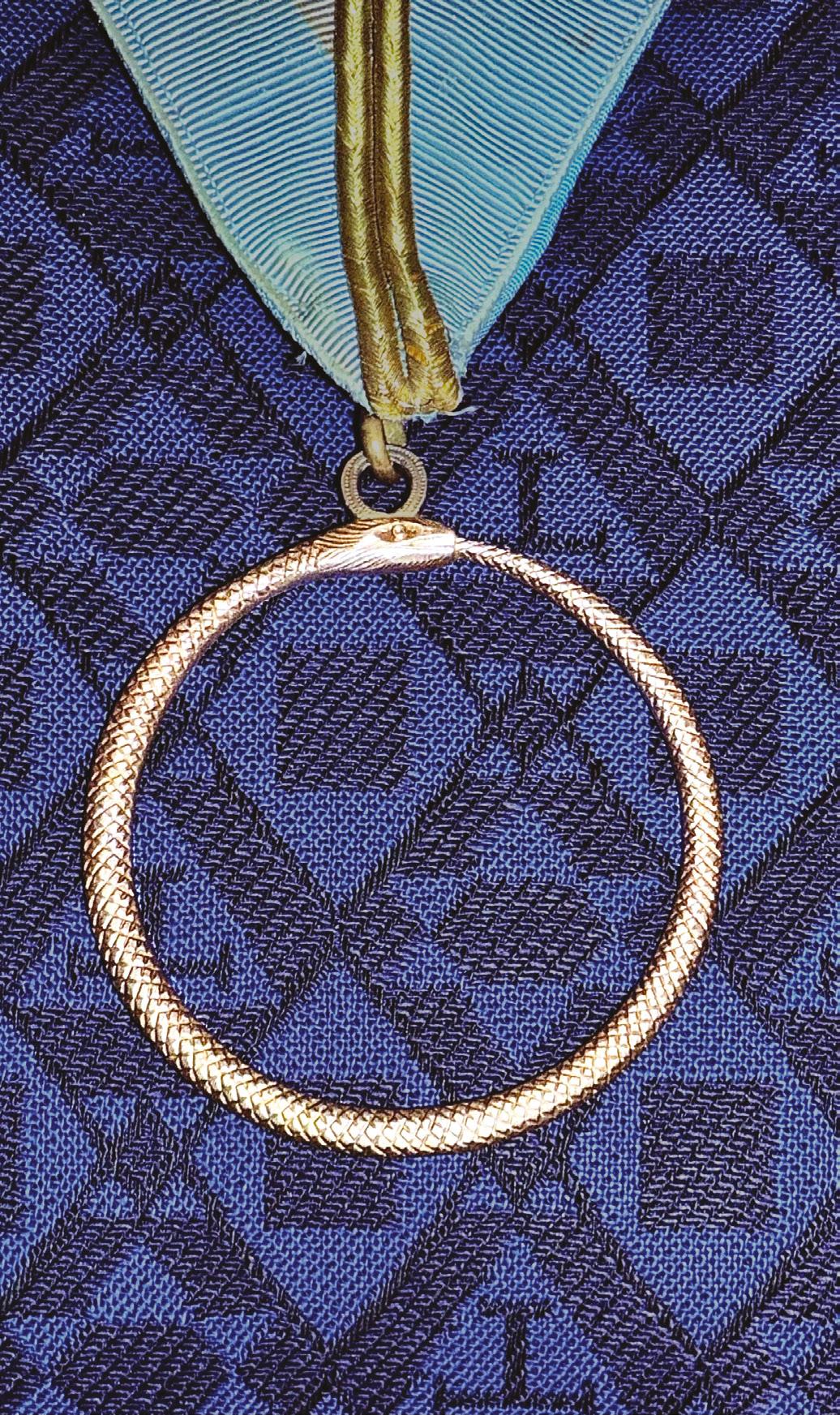
The Ouroboros, is an ancient emblem whispered about in esoteric circles. The word “Ouroboros” itself comes from the Greek for “tail-devourer”. This image of a snake forming a perfect circle is laden with meaning. It represents perpetual cyclic renewal, an infinite cycle of life, death, and rebirth leading toward immortality. For Freemasons, the Ouroboros holds a special allure. It speaks to the Craft’s core theme of eternal renewal, the notion that endings are but new beginnings in an unending quest for light.
The Ouroboros is not just a Masonic emblem, it is a universal symbol that has surfaced in the myths of many civilisations, each attributing to it a sense of cosmic continuity and renewal. In Norse mythology,
it appears as the world-serpent Jörmungandr, so immense that it encircles the entire earth, grasping its own tail in its teeth. Here the Ouroboros motif signifies the cosmic cycle of creation, destruction, and regeneration.
In Hindu thought, the Ouroboros motif emerges as well. The concept of kundalini, the spiritual energy coiled at the base of the spine, is vividly described as a serpent swallowing it’s tail. In this resting, selfcontained serpent, Indian sages saw a symbol of latent divine power, when awakened, rises through the chakras to bring spiritual illumination. The eternal return of the soul through samsara (the cycle of death and rebirth) is often likened to a snake endlessly circling upon itself, underscoring how deeply the idea of cyclical renewal runs in Hindu culture.
Even in the Americas, the Ouroboros has made its mark. The Aztecs and their predecessors in Mesoamerica, who saw time as a great repeating wheel, sometimes depicted their feathered serpent god Quetzalcóatl as an Ouroboros. On ancient temple reliefs, Quetzalcóatl is shown looped around, biting his own tail. This circular serpent, carved at the base of the Pyramid of the Feathered Serpent in Xochicalco, was a potent reminder of the continuity of time and the constant renewal of the sun and seasons. Similarly, indigenous peoples of South America told of a great anaconda at the world’s edge encircling the waters and swallowing its tail.
It is awe-inspiring that people who never met each other all gravitated to the Ouroboros. Whether guarding the edges of the world or illuminating the inner self, the image of the self-devouring serpent universally stands for wholeness, infinity, and the eternal cycle that governs existence. This breadth of cultural embrace reinforces the notion that the Ouroboros taps into a primal truth about renewal and continuity.
For Freemasons, the Ouroboros resonates on a profoundly personal level. We recognise that each ending is a new beginning, consider the closing of the lodge and the promise of renewed labour, or the symbolic death and rebirth reenacted in Masonic rituals. The snake devouring its tail is a mirror to the Mason’s own journey of self-improvement. Just as the Ouroboros regenerates from itself, so do we strive to regenerate our character and spirit in an ongoing cycle of transformation and self-mastery.

Historically, Freemasons have indeed adopted the Ouroboros in their symbolism. It adorned numerous Masonic seals and manuscripts especially in the 17th century, often encircling the square and compasses or other emblems of the Craft. This was no mere decoration, the brethren of earlier centuries understood that the Ouroboros was the circle made by a single endless line, representing the eternal nature of truth. It encircles the sacred mysteries, implying that the wisdom we seek has neither beginning nor end. The serpent’s circular form, containing everything within itself, evokes the oneness of the universe and the idea that all our knowledge and experiences are part of a greater whole.
Importantly, the Ouroboros also reminds us of spiritual immortality. As one cycle ends, another begins, and thus nothing true or worthy ever perishes, a comforting thought to any Mason who ponders his legacy. The celebrated psychologist Carl Jung, delving into alchemical symbols, once wrote that the Ouroboros “is a dramatic symbol for the integration of opposites”. In other words, it is a symbol of perpetual self-renewal and unending life. For a Freemason, this speaks to the immortal nature of the ideals we uphold. Every good deed, every bit of wisdom passed to a brother, is a way in which we ensure that a part of
us lives on, continually reborn in the ongoing life of the Craft.
In the end, the Ouroboros inspires us to see every end as a new beginning. It urges us to reflect on our journey as a continuous loop, one where each degree, each challenge in life, and each lesson learned is not a terminus but a turning point in an endless evolution. In contemplating this emblem of renewal, we are gently reminded that our work on the inner temple is never truly finished. Like the Ouroboros, we are ever in the process of re-creating ourselves.
Freemasons find a symbol of hope and continuity, a promise that as we strive for enlightenment and virtue, we participate in an ageless cycle. The Craft itself is renewed in each generation of Masons who take up the tools of self-improvement. Thus the Ouroboros, ancient and mystical, lives on in our fraternity not only as an image on a seal or page, but as a living principle in our hearts, the eternal return of Light, the unbreakable bond between past and future, and the knowledge that through transformation, we come ever closer to the eternal truths that our symbols strive to teach.
Collin Neal Node


Anno Lucis meets John Ellis to explore one of Freemasonry’s most distinctive Christian orders.
US ABOUT THE RED CROSS OF CONSTANTINE.
It’s a Christian Masonic order, open only to those Royal Arch Masons who profess the Trinitarian faith, so membership is limited to brethren with that belief. The structure of the order unfolds in four stages. First, you’re installed as a Knight of the Red Cross of Constantine. Later, typically at a provincial gathering, you’re conferred as a Knight of the Holy Sepulchre. Progressing through the chairs leads to the role of Eusebius in a College of Priest Masons, and ultimately, Most Priest and Sovereign in the Senate of Prince Masons.
I serve as the Deputy Intendant General for Hertfordshire. Our Intendant General is Terry Deakin, and I support him in the leadership of the province.
THE APPEAL OF THE ORDER TO NEW MEMBERS?
The narrative focuses on Constantine’s conversion to Christianity and the founding of Constantinople. The ceremonies aren’t overly solemn, they’re theatrical, engaging, and rich in symbolism. You begin the journey as a distressed Royal Arch Mason seeking refuge, and you’re welcomed into the order with warmth and dramatic flair.
Yes, more than in a Craft Lodge, and each comes with its own set of responsibilities and learning. The ritual is strongly emphasised. Members are encouraged to memorise the work rather than read it. One of the most involved ceremonies is the installation of a successor, which draws on four separate ritual books. It’s an ideal order for those who love ritual.
In Hertfordshire, many members are senior Masons who often join later in their Masonic journey, which can make progression difficult. That’s why we encourage brethren to consider joining earlier. We currently have three units: Royston, Radlett, and St Albans, all of which meet in the morning.
Largely to accommodate older members, though morning meetings also suit those who prefer to keep their evenings free. St Albans, for example, meets on Thursday mornings, followed by a light lunch. Other units tend to meet at weekends on a Saturday morning.
Charity is present but not frontand-centre. Alms are collected in silence, much like in the Rose Croix.
Contact the divisional recorder: steve@coath.info

The order often supports smaller local charities with the proceedings of its gatherings.
The closest parallel is probably the Knights Templar; both are chivalric and Christian in nature. Occasionally there’s confusion with the humanitarian Red Cross, but it’s rare.
Annual subscriptions are around £60. Initial regalia, such as the Purple sash, is typically loaned by the unit. Additional regalia costs between £40 and £50, with a grand rank sash closer to £120. Some officers wear swords, which can be costly if bought new, but there’s normally plenty of good used ones around the Province.
It’s a beautifully constructed Christian order with evocative ceremonial work. While not expensive, it demands a genuine commitment to ritual and learning.
We’re keen to grow awareness and membership. It all starts with Craft and Royal Arch, if those aren’t thriving, the wider Masonic family suffers.

If you haven’t logged into Solomon yet, you’re missing the best-kept open secret in Freemasonry. As Freemasons, we all promise to make a “daily advancement in Masonic knowledge,” and Solomon is a fun, easy tool to help you do exactly that. Whether you’re a newly initiated brother or a seasoned Past Master, Solomon offers something for everyone.
Solomon is essentially a virtual library of Masonic education. It’s a central repository of informative material to guide you along the path of Masonic learning. The platform contains hundreds of bitesized “nuggets” and longer papers on topics from ritual symbolism to Masonic history. You can access it on any device, any time, and new content is added regularly. Best of all, Solomon is completely free for all Freemasons, just register an account to start your journey.
Getting started with Solomon is simple. Just follow these steps:
1. Visit the Solomon website: Open your browser and go to www.solomon.ugle.org.uk (type it directly into the address bar, Solomon won’t usually appear via search).
2. Create an account: Click “Log in” then choose “Create new account.” Fill in the registration form with your details and set a password.
3. Verify your email: You’ll get a confirmation email, click the link in that message to activate your new account.
4. Log in and explore: Once verified, log in and start exploring. A great first stop is the Getting Started with Solomon module, which offers a handy video tour of the platform.
Why should every Hertfordshire Mason give Solomon a try? Here are some benefits:
• Expand Your Knowledge: Access hundreds of learning items covering almost every aspect of Freemasonry, from clear explanations of ritual and symbolism to fascinating pieces of Masonic history.
• For All Experience Levels: There’s something for everyone, no matter your rank or years in the Craft. An Entered Apprentice can learn fundamentals while a Master Mason or Royal Arch Companion explores deeper insights.
• Learn at Your Own Pace: Solomon is available 24/7 on your PC, tablet or smartphone, so you can study whenever it suits you, at your own pace.
• Understand Ritual & Symbolism: Solomon’s materials explain why we do what we do and the meanings behind our symbols, helping you appreciate the ritual on a deeper level.
• Free & Easy to Use: Solomon is free for all members, and it’s user-friendly. The site is intuitive to navigate, no technical expertise needed.
In Hertfordshire, we pride ourselves on our enthusiasm for Masonic learning. Our Provincial leaders encourage every brother to use Solomon to deepen their engagement with the Craft. By joining Solomon, you’ll gain valuable insights into Freemasonry.
So why wait? Give Solomon a try and take your Masonic journey to the next level. It’s simple, it’s free, and it’s made for you. As the saying goes, “wisdom dwells with Solomon.” Log in, explore, and enjoy the journey!
In the year that we remember the end of the Second World War, Bob Cordery looks at how United Grand Lodge dealt with the global conflicts
This year marks the eightieth anniversary of the end of the Second World War, and it is interesting to look back and examine the different ways in which the United Grand Lodge treated that war from the First or Great War.
If one reads the Minute Books of Lodges during the period from 1914 to 1918, one could almost imagine that there wasn’t a war on.
Meetings were held as usual, and the only mention of the war was usually a decision to set aside the yearly dues of those who were serving in the armed forces and Standing To Order to mark the death of a Lodge member or Lord Kitchener.
This was somewhat different from 1939 to 1945. For example, all Lodge Secretaries were required to send in a return that detailed the war work being undertaken by members, and these lists show that beside those serving in the Regular armed forces, many of the Brethren were in the Home Guard, the Air Raid Precautions, the Special Constabulary, or the National Fire Service.
When I was researching the history of the Herts Masters’ Lodge (4090), I came across the stories of several members whose war work is worth recounting here.
Lieutenant-Commander Reginald Howard Palmer OBE, RNVR (Salisbury Lodge) served with distinction during the First World War commanding several antisubmarine craft and became assistant to Vice Admiral Stephenson (the ‘Terror of
“Beside those serving in the Regular armed forces, many of the Brethren were in the Home Guard, Air Raid Precautions, or the National Fire Service.”
Tobermory’) during the Second. He helped to train over 900 ship’s crews in anti-submarine warfare and helped to win the Battle of the Atlantic.
Lieutenant-Colonel Alexander Woods MBE, TD (St Michael’s and Sawbridgeworth Lodges) served with distinction during the Great War and the Third Afghan War before resuming his career in banking. During the Second World War he commanded all ten battalions of the Home Guard in Birmingham.
Captain Godfrey Blagdon Westcott Kent TD (Royston Lodge) trained working dogs before war broke out, dog for the King and had been mobilised in 1939, he went on to become Chief Instructor at the War Dog Training School near Potters Bar. He subsequently joined the Staff of Combined Operations.
Bryan Douglas Nockolds (Stortford Lodge) was a solicitor in Bishop’s Stortford as well as being a volunteer firefighter with the Sawbridgeworth Fire Brigade, which he commanded from 1903 to 1907 and then again from 1913 to 1932. He returned to this post
when the Brigade became part of the National Fire Service in 1939 and remained there until the middle of 1948.
Lieutenant Stanley William Lowe GM, RNVR (St Nicholas Lodge) and Lieutenant Ronald George Walker (Knebworth Lodge) were both awarded the second highest gallantry award for bravery ‘not in the face of the enemy’.

They both served in Bomb Disposal, and in Brother Lowe’s case, the citation mentions that he dealt with eight parachute mines and seven other bombs over eight nights in April 1941.
Bob Cordery

We are proud to support Anno Lucis and support our team members in their work for the Province
A reputation built on providing first class, professional, service & care. Pleased to serve the provinces of East Anglia for over 130 years
• Local funeral homes, with all facilities
• 24-hour family careline, with qualified funeral directors available at all times
• A friendly, experienced and dedicated team
• Prepaid funeral plans / Recording of Funeral Wishes
• Mercedes fleet, horse-drawn funerals & specialist vehicles
• Full range of traditional and contemporary services
Our funeral homes are located in: Bishop's Stortford, Sawbridgeworth, Harlow, Epping, Loughton, Waltham Abbey, Great Dunmow, Braintree & Halstead
Our sister company, Peasgood & Skeates: Saffron Walden, Duxford, Cambridge & Haverhill peasgoodandskeates.co.uk

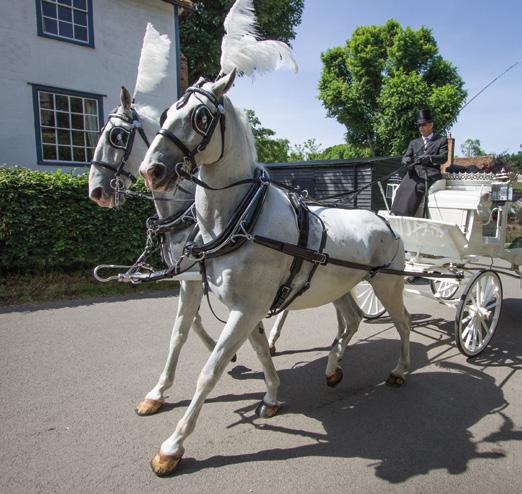
Many of us have missed a lodge meeting, either because of work, holidays or the dreaded cancelled train. Meet Brian Tierney MBE, a Brother who hasn’t missed a single meeting of Grove Park Lodge since he was initiated on 12th November 1964. That’s over 60 years. Without fail.
“Not once,” Brian says proudly. “Even when I had surgery last year, I made sure I recovered in time. I’ve never been close to missing one.”
Grove Park meets four times a year (five, back in the day), and Brian has been at every single one, a level of dedication that might just be a national record. “I heard Grand Lodge thought it was highly unusual,”.
Born in 1936 and initiated at the old Red Lion in Barnet (now a restaurant), Brian watched the Lodge move through Southgate before settling at the Halsey Hall Masonic Centre, Cheshunt, where it meets today. Alongside his perfect attendance, Brian also served as Assistant Provincial Grand Master for Hertfordshire, and professionally, he spent his working life as a building surveyor.
But it’s not just the record that stands out, it’s what it means to those around him.
“There’s huge pride in the Lodge,” he says. “The Brethren are really supportive. We’ve always been a strong, active group, even now, with fewer members, almost all of them attend.”
Grove Park was once one of the largest Lodges in the province with around 140 members. Though numbers are smaller today, Brian sees encouraging signs.
“We’ve had new initiates recently, and two more are on the way. And they’re not old like me, they’re young, enthusiastic. There’s real energy again.”
His influence stretches beyond Grove Park. One of Brian’s proudest achievements is founding and curating the museum, archive and library at Fleet House, a passion project that’s grown far beyond expectation.
“We started with nothing,” he says. “Now the museum’s full to bursting. Where other provinces have lost theirs due to space, ours is thriving, and I’m still there every Thursday, helping out.”
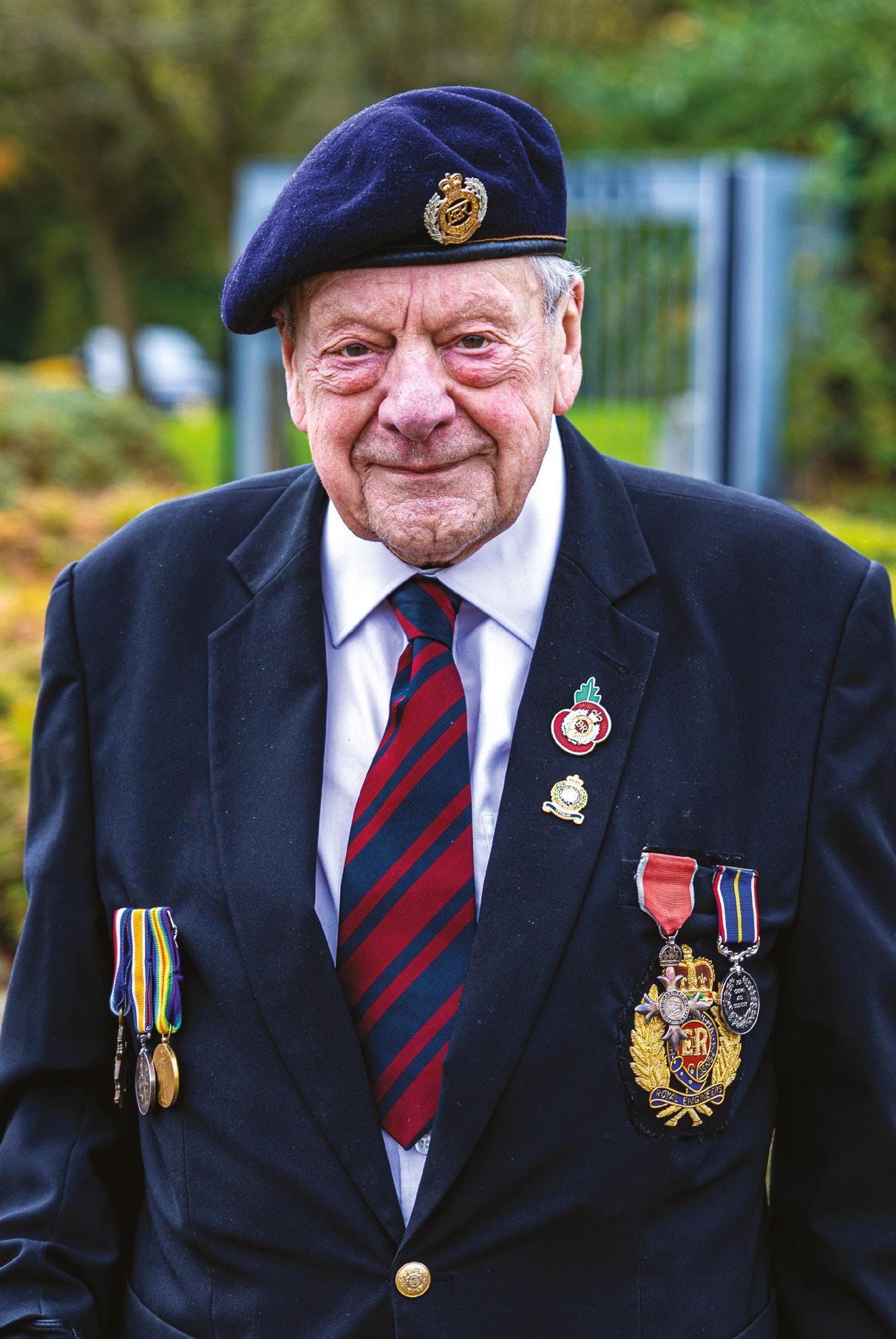
Now aged 89, Brian’s sense of humour is as sharp as ever. “I tell people I’ll be eighty ten at my next birthday, My daughter started that saying and it works for me!”
So, what’s the secret to showing up every time?
“No secret,” he says. “Just turn up, That’s the magic.”
As milestones go, 60 years of perfect attendance is extraordinary. But in Brian’s case, it’s more than just a record, it’s a symbol of love for the Craft, loyalty to his Lodge, and a legacy that will inspire many for years to come.
In a bold move to open doors and minds, Freemasons across Hertfordshire recently took part in a series of lively, enlightening, and refreshingly honest gatherings designed to connect members with the Provincial Team, and they were a resounding success.
Held across three venues and bringing together Brethren from Lodges throughout the Province, these informal evening events weren’t your average Masonic gathering. With a relaxed tone, plenty of good humour, and a genuine willingness to listen, the sessions offered something many had been waiting for, straight answers, open dialogue, and real connection.
The atmosphere buzzed as members were welcomed not just by familiar faces, but by the very people working behind the scenes to support them. Representatives from Membership, Mentoring, Learning & Development, Almoners, Charity and more. Each team spoke candidly about their purpose, their progress, and most importantly, their passion for making Freemasonry in Hertfordshire stronger, smarter, and more supportive than ever.
Brian Handley, energetic and passionate as ever, tackled the topic of membership head on, discussing the challenges Lodges face and offering real strategies for engaging and retaining newer Brethren. His drive to make membership more meaningful and dynamic was met with enthusiasm and interest from the audience.
Terry Pegg also took the floor, reflecting on his first year in the Learning and Development role. He

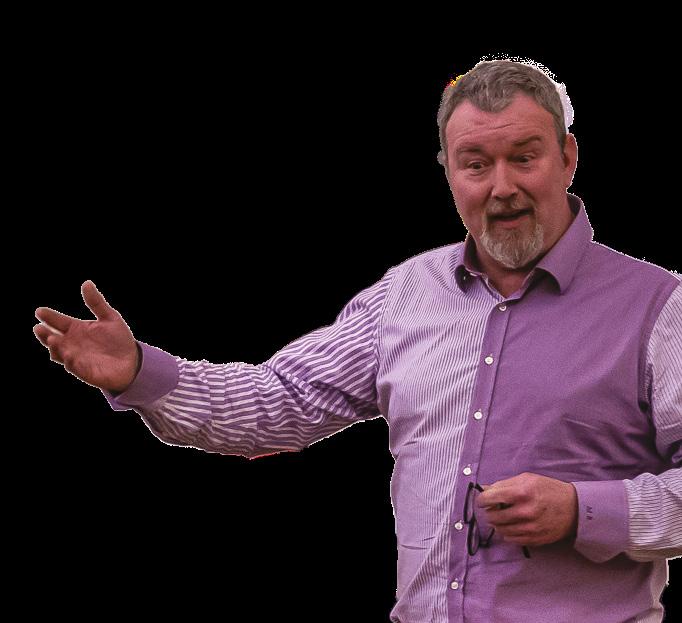
Lodges truly need. It wasn’t a lecture, it was a conversation, and one that many found refreshing and empowering.
Charity updates came from Paul Kelly, who spoke passionately about the soft launch of the 2030 Festival. He encouraged everyone to get involved and showed how even small contributions, when united in purpose, can make a lasting impact.
The Almoners’ Team, often quietly working behind the scenes, stepped into the spotlight to lift the veil on what they do. With sensitivity and honesty, they explained how they support members during life’s more difficult moments, discreetly, compassionately, and always with confidentiality at the heart of their role.
The highlight for many? Seeing leaders taking part. The Provincial Grand Master joined one of the sessions, offering his insights with warmth and humility, while the Grand Secretary lent his voice at another, an inspiring sign of how seriously the United Grand Lodge of England takes transparency and inclusion.
The chance to ask questions openly and get direct answers was invaluable. Whether it was about navigating Lodge challenges, understanding the Festival, or simply finding the right place to lend a hand, the Q&A sessions were honest, helpful, and occasionally even a little humorous.
These events weren’t just about listening, they were also about inviting. Each of the Provincial teams is always on the lookout for volunteers with the right skills and a desire to make a difference. Whether your strength is communications, charity, mentoring or anything in between, there’s a place for you to get involved and help shape the future of Freemasonry in Hertfordshire.
Good conversation goes a long way, when people are heard, they feel valued. The future of Freemasonry isn’t just in tradition, it’s in communication, community, and a willingness to evolve.

British Offsite has supported the construction of Thornwood Park, a new development of 56 traditional 3, 4 and 5 bedroom homes in Epping.
Construction was centred around British Offsite’s UNihouse system –precision manufactured internal and external panels and floors.
Step into any Hertfordshire lodge, whether it is the temple in St Albans or the centre in Cheshunt, and you will likely spot two curious blocks of stone resting quietly on the pedestals. One is jagged and raw, as though it has been hauled straight out of a quarry. The other is perfectly square, smooth and finished. To the uninitiated, they might look like leftover bits from a long-forgotten DIY project.

But every Freemason knows exactly what they are. The Rough Ashlar and the Perfect Ashlar are not just decorative pieces. They are symbols of something much greater.
They tell a story of personal growth, transformation, and the lifelong effort of becoming the best version of ourselves. In simple terms, the rough stone represents who we are when we enter the Craft. The perfect one represents who we are striving to become.

The Rough Ashlar symbolises the raw material: the new Mason. Unshaped, unrefined, but full of potential. Think back to your own initiation. Were you nervous? Curious? Slightly bewildered? Perfect. You were in exactly the right place. You were that rough stone at the beginning of your Masonic journey, with tools in hand and the future wide open.
Here in Hertfordshire, every Brother begins the same way. Whether he is a teacher from Tring, a taxi driver from Watford, or a web designer from Welwyn, no one walks into a lodge fully formed. Truthfully, that is what makes the journey so rewarding.
Freemasonry teaches us to use working tools symbolically to smooth out our character. Thankfully, no one is handing out real hammers. These tools represent patience, self-reflection, learning, and the kind support of our Brethren.
You will find this everywhere. The Past Master who kindly offers help with ritual. The Brother who checks in when you have had a tough week. The festive board banter that lifts your mood more than you expected. These are all gentle taps on the rough edges. Over time, they shape something better.
Now let us talk about the Perfect Ashlar. Spoiler alert: no one is actually perfect. Even the most polished Brother in the Province will tell you he is still learning. That is exactly the point. The Perfect Ashlar is not about flawlessness. It is about effort. It is a reminder to keep improving.
Each kind gesture, thoughtful decision or act of charity is another small chip off the old block. Slowly but surely, we smooth ourselves out. The best part is that we are not doing it alone. Freemasonry is a shared craft. The lodge is full of men on the same path. Some are just starting, some are further along, but all are working together to help one another become better.
A Brother from a Hertfordshire lodge recently joked at the festive board, “If I’m a perfect ashlar, it’s only because the rest of you kept knocking lumps off me!” It raised a laugh, but also a nod of agreement.
It is easy to think of Masonic symbols as abstract, but the Rough and Perfect Ashlars are deeply relatable. They remind us that improvement is not instant. It is a gradual process, full of highs and lows.
Some days you feel like you are making great progress. Other days, not so much. That is perfectly normal. Growth is not a straight line. Freemasonry offers a framework to help you keep going, even when things feel difficult. The aim is not to become flawless, but to become better than you were yesterday.
Your lodge is more than just a place to meet. It is your symbolic workshop. A place to reflect, practise, and recharge. It is where you try out the principles that shape your character, and where those principles are reinforced by the example of others.
You might arrive feeling tired after work, but leave with a clearer sense of purpose, uplifted by a few good words and the encouragement of your friends.
Next time you are at lodge and you see those two stones, take a moment to reflect. Smile at the Rough Ashlar. That is where you began. Acknowledge the Perfect Ashlar. That is where you are heading. The journey between them is what truly defines us.
Whether you are in your first year or your fiftieth, whether you are confident or still finding your footing, remember this: the most important thing is to keep going, keep learning, keep growing.
If anyone ever asks what those stones are doing on the pedestal in your lodge, you can simply say, “That’s me. Yesterday and tomorrow.”

A Festival is a fundraising appeal held to raise vital funds in support of the Masonic Charitable Foundation (MCF). Each Province typically holds a Festival once every 11 years, and the appeal runs for between five and seven years. During the Festival period, members are encouraged to donate, raise funds, take part in events and promote the work of our charity, joining together for the benefit of the Province, it’s members, and the MCF.
The MCF supports Freemasons and their dependents, as well as small and medium-sized charities across our Province and the wider UK. Approximately 60% of the MCF’s income comes from today’s Freemasons, with the majority of that raised through Festival appeals.
In 2023–24, the MCF made grants of £99,500 to charities in Hertfordshire and provided £277,000 of support to individuals and families in our province. In 2024–25, this support has grown significantly to almost £350,000. These grants provide assistance with daily living costs, health and wellbeing, mental health support, and educational needs for children and young people.
The Festival system underpins the MCF, which in turn supports a wide range of charitable and benevolent causes, whether within the Masonic community or across the wider public. Festivals shine a light on the values of Freemasonry, and fundraising efforts often foster a strong sense of unity, pride, and enjoyment among members.
As an individual, you can support the Festival and your lodge’s efforts by making a lump-sum donation or setting up a regular payment promise. You’ll find details on how to do this both on the Provincial website and through your Lodge Charity Steward.
If you set up a regular payment promise of £10 per month for a minimum of five years, you will qualify as a Festival Steward of the Hertfordshire 2030 Festival and receive your jewel in the month following your first payment. It’s as simple as that. Together, we can make a difference and help improve the lives of those in need.
The easiest way to support the Festival is to set up a direct debit online:
• https://bit.ly/4mkscvM
If a regular payment doesn’t suit you, you can make a one-off donation via:
• https://bit.ly/3SebYqp
SCAN TO MAKE A ONEOFF DONATION
You can also donate by phone:
By Direct Debit: 020 3146 3345
(Mon–Thu: 9.30am–4.30pm, Fri: 9.30am–3.30pm)
By Credit/Debit Card: 020 3959 2807 (Same hours)
Please ensure you have your bank or card details ready when calling.
By contributing to the 2030 Festival Appeal, we are helping ensure that this vital support continues long into the future.

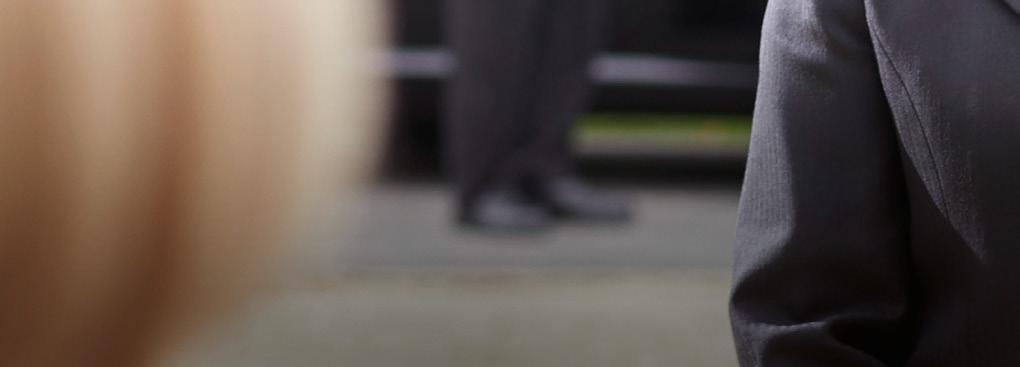


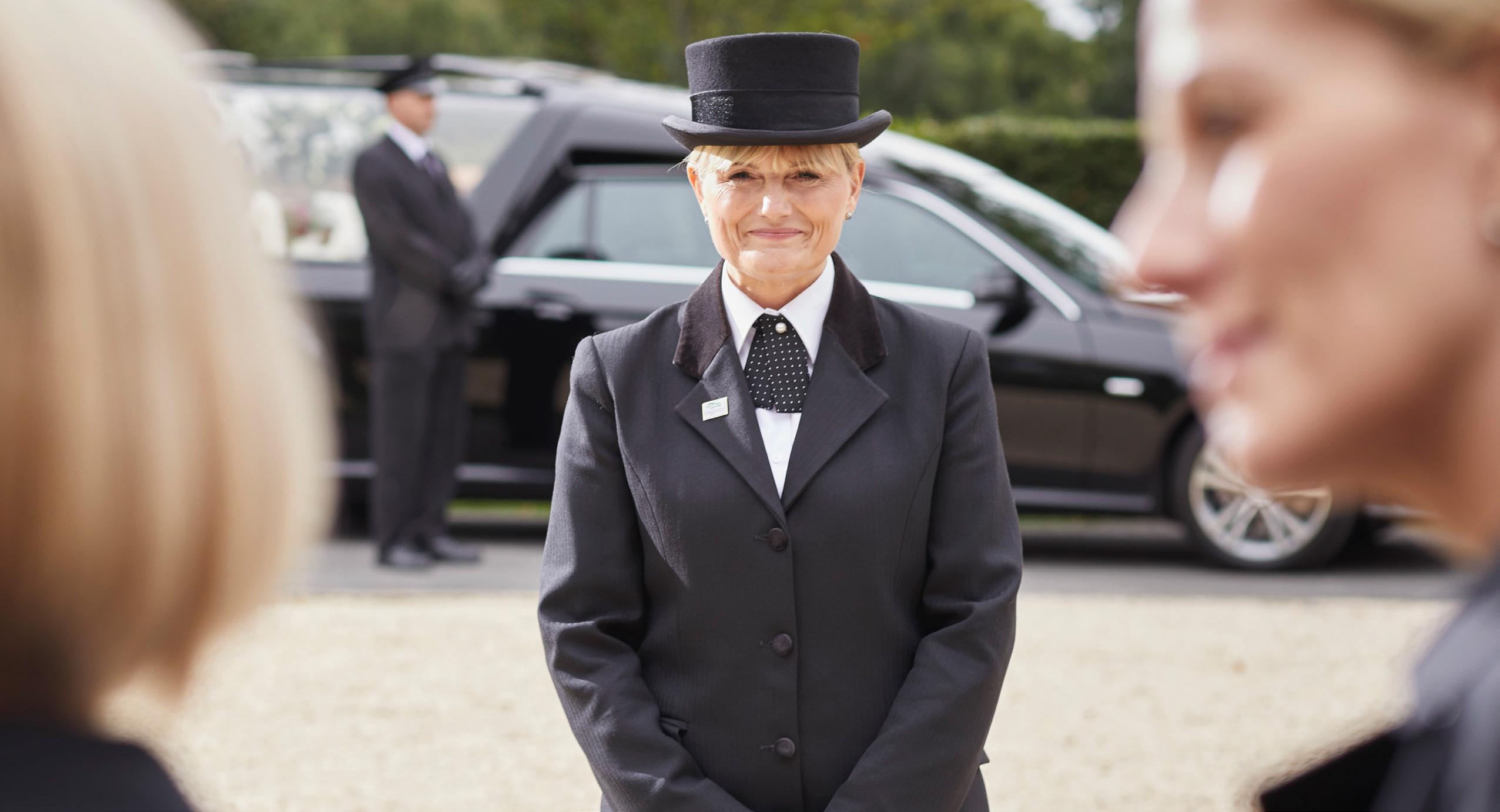

Powell Funeral Service
Nelson Court, Watton Road, Ware, SG12 0AA 01920 463260
79 Burford Street, Hoddesdon EN11 8HX 01992 470153
83 Railway Street, Hertford SG14 1RP 01992 509611
Malcolm Jones & Metcalfe
284 High Street, Berkhamsted HP4 1AH 01442 864548
E. H. Crouch
50 High Street, Baldock SG7 6BJ 01462 491144
52 Station Road, Letchworth SG6 3BE 01462 682868
S. A. Bates & Son
115 West Street, Dunstable, Bedfordshire, LU6 1SG 01582 663633
Macleans
837 St Albans Road, Garston, Watford WD25 0LH 01923 894116




Phillips Funeral Services
Dartmouth House,68 Alma Road, St Albans AL1 3BL 01727 851006
Parchment House, 9 Victoria Road, Harpenden AL5 4EB 01582 461100
Treeves House, 52 Shenley Road, Borehamwood WD6 1DS 020 8953 1444
Hemley Funeral Service
35 Harcourt Road, Bushey, Watford WD23 3PP 020 8950 7233
We’re here for you anytime. Whatever your wishes or budget, we can provide a funeral to suit you.